#mbti: function development
Explore tagged Tumblr posts
Text
I’m obsessed with MBTI as of 2 years ago and recently became obsessed again a few weeks ago. -INTP-T
Tips on developing Fe?
Edit: Found this Quora post! I will research. >:)
0 notes
Text
BSD MEN AND MBTI TYPES [+ their darlings]

So, I’m not sure how many are aware of what MBTI is, but I got a few requests on making an analysis about this for BSD MEN and incorporating their ideal type! darlings’ MBTI types as well, so I did. (I kind of promised that I would do it, so now is the time.)❤️
I want you to know, it wasn’t intentional to place one type as the ideal match for multiple characters. I thought it through thoroughly and did my best to remain as logical and diverse in MBTI types as possible. It’s just that strong Fe users are often a good match for broken people and…well…BSD men are mostly broken.
Here is a brief explanation what MBTI and cognitive functions are, for those who are not familiar with it. If you are familiar with it, you can simply skip to the next paragraph under the thinner cut.❤️

Explanation MBTI: The Myers-Briggs Type Indicator (MBTI) is a tool used to understand different personality types based on how people prefer to interact with the world and make decisions. Created by Isabel Briggs Myers and Katharine Cook Briggs, it’s based on ideas from Carl Jung about how people think and behave. MBTI types are 16 four-letter combinations such as INFP or ESTP, that are designed with each 4 primary cognitive functions that are being used frequently by each person. There are 8 cognitive functions, and we all use all of them, however, 4 are always the most comfortable and prominent.
Detailed Explanation of Cognitive Functions: Cognitive functions are specific mental processes that shape how we understand and interact with the world. Each function has a particular role and works in conjunction with others to influence personality. Here’s a closer look at each of the eight cognitive functions:
1. Extraverted Sensing (Se): This function involves focusing on the present moment and taking in information through the senses. People who rely on Se are very aware of their surroundings and enjoy engaging with their environment actively. They tend to live in the moment and respond to immediate sensory experiences.
2. Introverted Sensing (Si): Si involves recalling past experiences and using that information to understand the present. People with strong Si focus on details and how things have been done before. They rely on their memories and internal impressions to make sense of the world.
3. Extraverted Intuition (Ne): Ne is about exploring possibilities and seeing connections between different ideas. Those who use Ne are good at brainstorming and considering multiple potential outcomes. They enjoy thinking about future possibilities and spotting patterns that aren’t immediately obvious.
4. Introverted Intuition (Ni): Ni involves forming insights and understanding future implications based on internal reflections. People with dominant Ni often have a clear vision of how things might unfold and focus on long-term outcomes and deep, conceptual understandings.
5. Extraverted Thinking (Te): This function focuses on organizing and structuring the external world based on logic and efficiency. People who use Te prioritize objective criteria and practical solutions, often seeking to improve systems and achieve measurable results.
6. Introverted Thinking (Ti): Ti involves analyzing and refining ideas based on internal logic. Individuals with strong Ti prefer to understand concepts deeply and develop their own internal frameworks for how things should work. They value precision and consistency in their thoughts.
7. Extraverted Feeling (Fe): Fe is concerned with understanding and responding to the emotions and needs of others. People with strong Fe are focused on creating harmony in their social environments and are sensitive to the feelings of those around them. They often work to ensure that everyone’s needs are met and that social interactions are smooth.
8. Introverted Feeling (Fi): Fi involves making decisions based on personal values and internal emotional responses. Those with dominant Fi focus on staying true to their own principles and beliefs. They prioritize authenticity and personal integrity, making choices that align with their internal values.
Each MBTI personality type has a specific hierarchy of these functions. The dominant function is the primary way a person interacts with the world, while the auxiliary function supports it. The tertiary function is less developed, and the inferior function is the least developed and often a source of stress or growth.

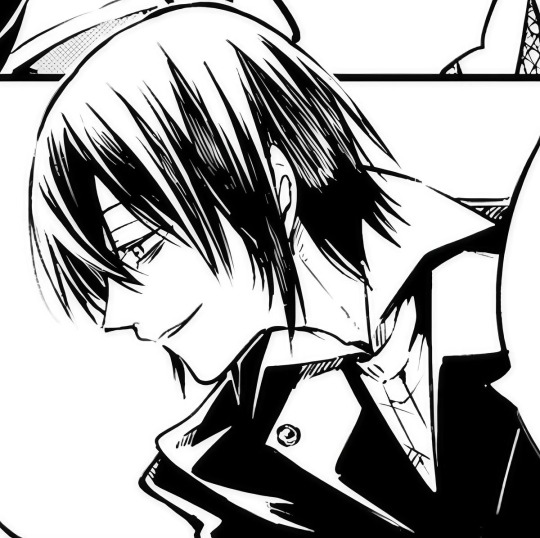

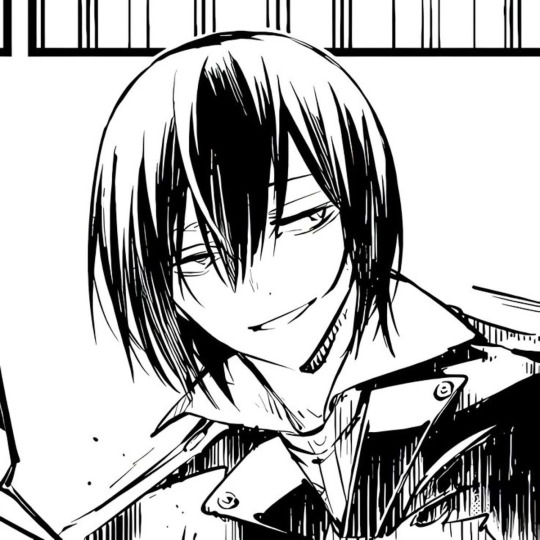
FYODOR DOSTOEVSKY
INTJ (The Mastermind/Architect) - Ni > Te > Fi > Se
Fyodor's dominant function, Introverted Intuition (Ni), reveals itself in his visionary, long-term thinking and his deep strategic foresight. Fyodor operates on a plane that transcends the immediate and the obvious.
He sees patterns, connections, and the potential outcomes of his actions far into the future, often perceiving the world in ways that others simply cannot comprehend.
His overarching goal—to cleanse humanity of its sins—demonstrates a profound understanding of abstract concepts and an almost prophetic ability to see beyond the present, traits quintessential to a dominant Ni user.
Next, we have Extroverted Thinking (Te), Fyodor's auxiliary function, which he employs with ruthless efficiency. His actions are driven by a need to impose order and structure on the chaotic world around him, aligning perfectly with Te's desire for effectiveness and productivity.
Fyodor’s methods, while morally ambiguous, are meticulously planned and executed with precision. This function supports his Ni visions, allowing him to implement his grand schemes with logical, calculated steps.
His ability to manipulate people and situations to his advantage is a direct result of Te’s influence, prioritizing objective outcomes over personal feelings.
His tertiary function, Introverted Feeling (Fi), is less overt but still crucial to understanding his character.
While Fyodor presents a cold, calculating exterior, his actions are ultimately guided by an internal value system—no matter how warped it might seem.
Fyodor's Fi manifests in his unwavering belief in his mission and his disdain for those who fail to meet his moral standards. He perceives himself as a savior of humanity, driven by an intrinsic sense of right and wrong that only he truly understands.
This Fi also explains why Fyodor is so selective about who he allows into his inner world. A potential darling, for instance, would need to align with his deeply held values, reinforcing the notion that Fyodor’s emotional connections are reserved for those who resonate with his internal compass.
Lastly, Fyodor’s inferior function, Extroverted Sensing (Se), is the least developed, manifesting in his apparent disconnection from the physical world.
Unlike characters who thrive on sensory experiences, Fyodor often appears aloof and detached from his surroundings. His focus on abstract ideas over tangible realities suggests a discomfort with Se.
He surrounds himself with serene and controlled environments—places where sensory overload is minimized, and he can concentrate on his internal visions. This discomfort with the physical world further isolates him, reinforcing his preference for solitude and reflection.
In conclusion, Fyodor embodies the traits of an INTJ through his dominant Ni, which allows him to see far-reaching possibilities and plan accordingly; his auxiliary Te, which drives his strategic actions and manipulations; his tertiary Fi, which shapes his personal values and judgments; and his inferior Se, which leads to a disconnect from the immediate physical world.
These cognitive functions, taken together, explain his complex and morally ambiguous character, as well as his potential preferences in a partner—someone who would understand and complement his internal world without disrupting the carefully constructed order he seeks to maintain.
His darling: INFP - Fi > Ne > Si > Te
or INFJ - Ni > Fe > Ti > Se
INFP (The Mediator / Idealist):
In the intricate labyrinth of Fyodor’s mind, where Introverted Intuition (Ni) reigns supreme (this sounds so serious lmao), an INFP female darling would offer an unparalleled balance and harmony.
Her dominant function, Introverted Feeling (Fi), would resonate deeply with Fyodor's own Fi, albeit in a more developed and nuanced form.
While Fyodor’s Fi is selective, almost reclusive, it is this very selectiveness that makes an INFP’s Fi the perfect match. She possesses an intrinsic moral compass, one that is authentic and unwavering, but unlike Fyodor’s, it is deeply empathetic.
Her Fi would draw out the softer, more vulnerable aspects of his tertiary Fi, helping to humanize the rigid internal values that guide his every move.
The INFP’s Extroverted Intuition (Ne), her auxiliary function, would offer Fyodor something he might not even realize he craves—a partner who can perceive multiple possibilities and ideas without being constrained by rigid logic or efficiency.
Her Ne would inject a sense of wonder and exploration into Fyodor’s meticulously controlled world. Unlike the ruthless precision of his Te, her Ne is imaginative, often seeing potential in areas Fyodor’s Ni might overlook (seriously, this man would NEVER overlook anything but let’s stick to that for the narrative).
This openness to possibility would challenge Fyodor, gently encouraging him to see beyond his single-minded visions, adding layers of depth to his already profound insights.
Furthermore, the INFP’s Introverted Sensing (Si) as a tertiary function would provide a subtle, yet grounding influence on Fyodor.
While Fyodor’s inferior Se leaves him disconnected from the physical world, the INFP’s Si, though not dominant, would allow her to appreciate the simple, sensory experiences of life.
She could offer Fyodor a gentle introduction to these experiences, helping him connect, even briefly, with the present moment. Her Si would serve as a quiet anchor, providing stability without overwhelming his discomfort with Se.
Lastly, her Extroverted Thinking (Te) as an inferior function would ensure that while she respects Fyodor’s logical and structured approach, she would not challenge his authority or disrupt the order he values so highly. Instead, her Te would emerge in moments when practicality is required, complementing Fyodor’s own Te without competing with it.
This would create a dynamic where she supports his strategies and plans, but with a gentle touch that allows his Te to dominate, thus preserving the balance of power in the relationship.
In conclusion, an INFP female darling would not only complement Fyodor’s complex INTJ personality but would also provide a much-needed counterbalance to his intensity.
Her Fi would resonate with his, but with a warmth and empathy that could soften his cold, calculating exterior. Her Ne would challenge and expand his Ni, offering new perspectives and possibilities.
Her Si would ground him, even if only slightly, in the present moment, while her inferior Te would respect and subtly support his strategic dominance.
Together, they would form a partnership where his visionary goals are met with understanding, warmth, and a touch of whimsy—qualities that, in the end, may be precisely what Fyodor needs, even if he cannot fully articulate it.
INFJ (The Advocate/Counselor):
An INFJ female darling would be the second-best match for Fyodor, harmonizing with his complex, enigmatic nature while still offering a dynamic that enriches his inner world.
As an INFJ, her dominant function, Introverted Intuition (Ni), aligns perfectly with Fyodor's own Ni, creating a profound connection rooted in their shared ability to perceive the world through abstract, visionary lenses.
This mutual understanding of the intangible and the hidden would foster a relationship where both partners feel deeply understood, even in their most esoteric thoughts. Fyodor, who often finds himself isolated in his strategic foresight, would find in the INFJ a partner who not only comprehends but complements his intuitive depth.
Her Extroverted Feeling (Fe) as an auxiliary function introduces a crucial element of emotional intelligence that Fyodor lacks. While Fyodor’s tertiary Introverted Feeling (Fi) shapes his internal value system, it is often cold, detached, and selectively applied.
The INFJ’s Fe, however, is outwardly focused, naturally attuned to the emotions and needs of others. This function would provide Fyodor with a compassionate, empathetic counterpart who can navigate social dynamics and offer a broader perspective on human emotions—something his Te might dismiss as irrelevant.
The INFJ's Fe would soften Fyodor’s rigid moral judgments, gently encouraging him to consider the emotional consequences of his actions, thereby broadening his understanding of the world beyond his own internal values.
Moreover, the INFJ's Introverted Thinking (Ti), her tertiary function, would subtly complement Fyodor's auxiliary Te. While her Ti is less overt, it allows her to engage in deep, reflective thinking, often uncovering logical inconsistencies or hidden truths in complex situations.
Her Ti would not threaten his Te-driven need for control and order but would instead offer a nuanced, thoughtful perspective that Fyodor could appreciate, particularly when his Ni-driven visions require careful refinement.
This quiet analytical ability would appeal to Fyodor's Te, creating moments of intellectual synergy where both can engage in strategic planning and problem-solving.
Lastly, the INFJ's Extroverted Sensing (Se) as an inferior function mirrors Fyodor's own inferior Se, establishing a shared discomfort with the immediate, sensory world.
This mutual weakness might initially seem like a drawback, but it would actually deepen their bond. Both partners would understand and respect each other's preference for controlled, serene environments, where they can retreat from the overwhelming demands of the physical world.
Their shared Se would reinforce their tendency towards introspection and visionary thinking, ensuring that their relationship remains focused on the abstract, the intellectual, and the strategic.
In conclusion, an INFJ female darling offers Fyodor a harmonious blend of shared intuitive depth and complementary emotional intelligence.
Her Ni resonates with his, creating a deep, almost mystical connection, while her Fe introduces warmth and empathy into his otherwise cold, calculated world.
Her Ti supports and refines his Te-driven plans without challenging his authority, and their shared inferior Se creates a mutual understanding of their need for isolation from the sensory overload of the external world.
While an INFP might provide a softer, more whimsical counterbalance, the INFJ offers a partnership rooted in shared vision and mutual understanding, making her the second-best match for Fyodor's complex, INTJ personality.

DAZAI OSAMU
ENTP (The Debater / Visionary) - Ne > Ti > Fe > Si
Dazai’s dominant function, Extraverted Intuition (Ne), reveals itself in his constant exploration of possibilities and his ability to see multiple angles in any situation.
Dazai operates in a world of endless potential, always considering what could be rather than what is. This makes him unpredictable and difficult to pin down, as he is always a step ahead, contemplating outcomes and scenarios that others might overlook.
His strategic brilliance is a direct result of his Ne, allowing him to manipulate events and people with a creativity that is unmatched.
Dazai’s love for chaos and his playful, almost mischievous nature also stem from this dominant function, as he thrives in environments where he can test boundaries and explore new ideas.
Next, we have Introverted Thinking (Ti), Dazai’s auxiliary function, which he uses to analyze situations with a cold, logical precision.
Ti drives Dazai to understand the underlying mechanics of the world around him, breaking down complex problems into their fundamental components. This function is what gives Dazai his sharp, analytical mind, allowing him to devise intricate plans and see through the facades of others.
His Ti also explains his philosophical musings and existential questioning, as he is constantly trying to make sense of the world and his place in it. Despite his often lighthearted demeanor, there is a deeply intellectual side to Dazai that is always at work, dissecting and evaluating everything he encounters.
His tertiary function, Extraverted Feeling (Fe), is less prominent but still plays a crucial role in how Dazai interacts with others. While he often comes across as detached, Dazai is acutely aware of social dynamics and the emotions of those around him.
He uses this awareness to his advantage, charming or manipulating others as the situation requires. Fe allows Dazai to adapt to different social environments effortlessly, making him a social chameleon who can navigate complex interpersonal relationships with ease.
However, this function also reveals a more manipulative side to Dazai, as he tends to use his understanding of emotions not to connect with others, but to influence and control them.
Lastly, Dazai’s inferior function, Introverted Sensing (Si), is the least developed, manifesting in his apparent disconnection from tradition and the past.
Unlike characters who draw strength from their memories or rely on established routines, Dazai is often seen rejecting or ignoring these aspects of life.
His Si deficiency is evident in his restless nature and his constant search for new experiences, as he struggles to find meaning or stability in what has already been.
This disconnect from Si also contributes to his existential despair, as he finds it difficult to ground himself in any lasting sense of identity or purpose.
In conclusion, Dazai embodies the traits of an ENTP through his dominant Ne, which fuels his endless curiosity and strategic foresight; his auxiliary Ti, which sharpens his analytical thinking; his tertiary Fe, which he uses to navigate and manipulate social interactions; and his inferior Si, which leads to a sense of disconnection from tradition and the past.
These cognitive functions, taken together, explain his complex and often contradictory character, as well as his tendency to oscillate between playful banter and deep existential reflection.
His darling: INFJ - Ni > Fe > Ti > Se
Or ENFJ - Fe > Ni > Se > Ti
INFJ (The Advocate/Counselor):
For Dazai, an INFJ female darling would be the ideal match, complementing and balancing his complex, multifaceted ENTP nature.
Dazai’s dominant Extraverted Intuition (Ne) thrives on possibilities, unpredictability, and the exploration of various outcomes, often leading him into chaotic and uncharted territories. An INFJ’s dominant function, Introverted Intuition (Ni), would resonate with Dazai’s Ne, but in a way that brings focus and depth to his endless curiosity.
While Dazai’s Ne scatters in multiple directions, the INFJ’s Ni would help him see the underlying patterns and deeper meaning behind his explorations, guiding his often chaotic energy into more purposeful and profound insights.
Her Ni would provide a sense of direction that Dazai’s Ne sometimes lacks, allowing them to explore the abstract and conceptual together, but with a shared vision rather than aimless wandering.
Her Extroverted Feeling (Fe) as an auxiliary function would offer a crucial emotional anchor for Dazai, whose Extraverted Feeling (Fe), while present, is often used more for manipulation than genuine connection.
The INFJ’s Fe, however, is deeply empathetic, focused on creating harmony and understanding in her relationships. This emotional intelligence would be a soothing balm to Dazai’s restless soul, providing the warmth and connection he often deflects with humor or detachment.
Her Fe would help Dazai engage with his own emotions more honestly, encouraging him to forge deeper, more meaningful relationships rather than merely skimming the surface.
This would be especially significant for Dazai, whose tertiary Fe can sometimes lead him to feel disconnected from others despite his ability to read social dynamics effortlessly.
The INFJ’s Introverted Thinking (Ti), as her tertiary function, would complement Dazai’s auxiliary Ti, creating an intellectual synergy that both would appreciate.
While Dazai uses his Ti to deconstruct the world around him with sharp, analytical precision, the INFJ’s Ti would offer a quieter, more introspective form of analysis.
Her Ti would challenge Dazai’s sometimes impulsive leaps of logic, encouraging him to consider the ethical and philosophical implications of his actions more deeply. Together, their combined Ti would lead to rich, intellectual conversations, where they can explore complex ideas and theories, each offering a perspective that sharpens the other’s understanding.
Lastly, the INFJ’s Extroverted Sensing (Se), though her inferior function, would mirror Dazai’s own inferior Introverted Sensing (Si) in a way that fosters mutual understanding and growth.
Both struggle with staying grounded in the present moment and often feel disconnected from the physical world or their own past.
However, this shared deficiency would allow them to support one another, finding solace in their mutual discomfort.
The INFJ’s Se might encourage Dazai to occasionally step out of his head and experience the world more fully, while Dazai’s Ne could help the INFJ see the potential beyond what is immediately tangible.
Together, they would create a partnership that balances the abstract with the concrete, allowing them to explore both the potential of the future and the reality of the present.
In conclusion, an INFJ female darling would not only complement Dazai’s ENTP nature but also provide the emotional depth, intellectual stimulation, and intuitive insight that he often seeks but struggles to find.
Her Ni would bring focus to his Ne, her Fe would offer genuine emotional connection where his Fe might falter, her Ti would refine his analytical thinking, and their shared challenges with Se and Si would foster a deep understanding of each other’s struggles.
This relationship would offer Dazai a rare blend of intellectual challenge and emotional support, making the INFJ the best possible partner for his complex and often contradictory character.
ENFJ (The Protagonist / Teacher):
An ENFJ female darling would be the second-best match for Dazai Osamu, providing a relationship dynamic that complements and balances his ENTP nature in several key ways.
Dazai’s dominant Extraverted Intuition (Ne) fuels his exploration of possibilities and his knack for seeing multiple angles of any situation. An ENFJ’s dominant Extraverted Feeling (Fe) would harmonize with Dazai’s Ne, but in a manner that emphasizes emotional connection and social harmony.
The ENFJ’s Fe is adept at understanding and influencing others’ emotions, which would provide Dazai with a stabilizing force, guiding his often chaotic and unpredictable Ne through a lens of empathy and relational awareness. Her Fe would help Dazai see beyond his own intellectual pursuits and appreciate the emotional impact of his actions on those around him.
The ENFJ’s Introverted Intuition (Ni) as her auxiliary function complements Dazai’s Ne by providing depth and focus to their shared explorations.
While Dazai’s Ne leads him to constantly generate new ideas and scenarios, the ENFJ’s Ni would help in distilling these possibilities into a coherent vision. This alignment between Ne and Ni would create a synergy where their ideas are not just imaginative but also strategically meaningful.
The ENFJ’s Extraverted Sensing (Se) as her tertiary function brings a practical, immediate awareness that contrasts with Dazai’s own inferior Introverted Sensing (Si).
While Dazai often struggles with connecting to the present moment and the sensory details of life, the ENFJ’s Se would offer a grounding influence.
Her ability to engage with the external environment would provide a counterbalance to Dazai’s tendency to overlook sensory experiences and tradition. This could help Dazai become more attuned to the here-and-now, enriching his experiences and providing a more balanced perspective on life.
Finally, the ENFJ’s Introverted Thinking (Ti), her inferior function, would offer a unique intellectual counterpoint to Dazai’s dominant Ti.
While Dazai’s Ti is sharp and analytical, often used to dissect and strategize, the ENFJ’s Ti, though less developed, would bring a different flavor of logical analysis.
Her Ti would provide a thoughtful, albeit less dominant, approach to problem-solving, complementing Dazai’s more assertive analytical style. This could lead to rich, nuanced discussions where her perspective enhances his own.
In summary, an ENFJ darling would offer Dazai a blend of emotional depth, strategic insight, and practical grounding.
Her dominant Fe would foster genuine emotional connections and help Dazai consider the social and emotional ramifications of his actions.
Her Ni would add depth and direction to his Ne-driven explorations, making their intellectual pursuits more coherent.
Her Se would ground him in the present, counterbalancing his detachment from sensory experiences, while her Ti would complement and refine his analytical approaches.
Together, they would form a partnership where Dazai’s intellectual brilliance is balanced by the ENFJ’s warmth, vision, and practical insight, making her an excellent second-best match for his dynamic ENTP personality.
In conclusion, an INFJ would offer Dazai deep emotional understanding and intuitive focus, complementing his Ne with depth and introspection.
In contrast, an ENFJ would provide vibrant emotional support and practical grounding, balancing his Ne with empathy and vision while offering immediate sensory awareness.
Both types would enrich Dazai’s life, with the INFJ providing profound, intuitive insight and the ENFJ offering dynamic emotional connection and practical stability.

NAKAHARA CHUUYA
ESTP ( The Entrepreneur / Dynamo) - Se > Ti > Fe > Ni
Chuuya is a character who clearly exemplifies the ESTP personality type. His energetic demeanor, tactical mindset, and grounded approach to life can be understood through the lens of this personality type, revealing a man who thrives on action, pragmatic problem-solving, and sensory experiences.
At the forefront of Chuuya’s character is his dominant function, Extraverted Sensing (Se). This function drives Chuuya’s immediate, action-oriented approach to life. He is intensely aware of his surroundings, reacting quickly to changes and seizing opportunities as they arise.
Chuuya’s preference for hands-on engagement and his readiness to dive into action reflect his high Se, which is evident in his frequent physical confrontations and his ability to handle high-pressure situations with remarkable composure.
His keen sense of fashion is also a manifestation of his Se—his attention to stylish, elegant attire and personal presentation highlights his acute awareness of his environment and his desire to make a tangible impact on those around him.
This focus on immediate, sensory experiences underscores his reliance on Se, making him a master of adapting to and manipulating his environment in real-time.
Next is Introverted Thinking (Ti), Chuuya’s auxiliary function, which supports his strategic prowess and decision-making. While Chuuya is often seen as impulsive and driven by immediate sensations, his actions are underpinned by a logical framework that guides his responses and strategies.
His Ti helps him analyze situations with a critical eye, allowing him to understand and exploit the underlying mechanics of conflicts and challenges. This function contributes to his ability to think on his feet and devise practical solutions to complex problems, aligning with his reputation as a formidable tactician within the Port Mafia.
Extraverted Feeling (Fe), Chuuya’s tertiary function, reveals itself in his interactions with others and his capacity for emotional expression.
While Chuuya may come across as brash and direct, his Fe is evident in his concern for his allies and his desire for harmony within his sphere of influence.
His loyalty and protective nature, particularly toward those he values, highlight his underlying emotional sensitivity and his need to maintain social cohesion.
Although he may not always express his feelings openly, his actions often reflect a deep-seated desire to connect with and support those he cares about, indicating that his Fe is engaged in maintaining relationships and managing social dynamics.
Finally, Chuuya’s inferior function, Introverted Intuition (Ni), is the least developed and manifests as a disinterest or discomfort with long-term planning and abstract conceptualization.
Unlike characters who are comfortable envisioning future possibilities and intricate schemes, Chuuya is more focused on the present moment and immediate concerns.
His actions and decisions are primarily driven by the current situation rather than long-term projections, suggesting that he is less inclined to engage in deep, abstract thinking.
This disconnection from Ni is reflected in his preference for direct action over speculative or future-oriented planning.
In conclusion, Chuuya embodies the ESTP personality through his dominant Se, which drives his action-oriented and sensory-focused approach, including his keen sense of fashion; his auxiliary Ti, which supports his tactical thinking and problem-solving; his tertiary Fe, which influences his emotional interactions and loyalty; and his inferior Ni, which leads to a preference for present-focused, pragmatic decisions.
His darling: ISFJ - Si > Fe > Ti > Ne
Or ESFJ - Fe > Si > Ne >Ti
ISFJ (The Protector / Defender)
An ISFJ female darling would be the ideal match for Chuuya Nakahara, providing a harmonious balance to his dynamic ESTP personality. Her dominant Introverted Sensing (Si) would offer the grounding and stability that Chuuya, with his action-oriented and spontaneous approach to life, often lacks.
Her strong connection to tradition and the past would provide a comforting anchor for Chuuya, helping him appreciate consistency and reliability, which are sometimes overlooked in his pursuit of immediate, sensory experiences.
The ISFJ’s Extraverted Feeling (Fe) would perfectly complement Chuuya’s tertiary Fe, creating a nurturing and emotionally supportive relationship.
While Chuuya’s Fe drives him to protect and connect with those he cares about, her more developed Fe would bring warmth, compassion, and an understanding of social dynamics that could soften Chuuya’s rougher edges.
Her natural ability to maintain harmony and cater to the emotional needs of others would resonate with Chuuya’s loyalty and protectiveness, fostering a deep emotional bond based on mutual care and respect.
Her Introverted Thinking (Ti), though secondary to her Si and Fe, would align well with Chuuya’s auxiliary Ti. Both would appreciate each other’s logical approach to problem-solving and decision-making.
Her Ti would offer a calm, methodical perspective that could help Chuuya refine his strategies and think through the consequences of his actions more thoroughly, especially in situations where his impulsive nature might otherwise lead him astray.
Lastly, the ISFJ’s Extraverted Intuition (Ne), as her inferior function, would introduce a subtle yet valuable element of novelty and open-mindedness into the relationship. While her Ne is less dominant, it would still encourage Chuuya to occasionally consider new possibilities and explore ideas beyond his immediate focus.
This would add a refreshing dynamic to their relationship, allowing them to grow together as they explore new experiences within the safety and security of their shared bond.
In conclusion, an ISFJ female darling would provide Chuuya with the stability, emotional support, and subtle encouragement he needs to thrive both personally and within his intense lifestyle. Her grounding Si, nurturing Fe, logical Ti, and adaptable Ne would create a balanced and fulfilling relationship, making her the best match for Chuuya’s ESTP personality.
ESFJ (The Provider / Consul)
An ESFJ female darling would be an excellent second option for Chuuya Nakahara, offering a complementary dynamic to his ESTP personality. Her dominant Extraverted Feeling (Fe) would naturally resonate with Chuuya’s own Fe, albeit at a more developed level, creating a relationship built on mutual emotional understanding and a strong sense of loyalty.
While Chuuya’s Fe drives him to protect and maintain harmony within his circle, her Fe would bring an even deeper focus on fostering social connections and ensuring that the emotional needs of those around them are met.
This shared focus on relationships would strengthen their bond and make them a formidable team when it comes to navigating the social complexities of their world.
The ESFJ’s Introverted Sensing (Si), as her auxiliary function, would offer Chuuya the stability and groundedness he sometimes lacks in his spontaneous and action-driven approach to life.
Her strong connection to tradition and the past would provide a comforting and steady influence, helping Chuuya to appreciate the value of consistency and reliability in both his personal life and his role within the Port Mafia.
This would be especially valuable in moments when Chuuya’s dominant Se might lead him to prioritize the thrill of the present over long-term stability.
Her tertiary Extraverted Intuition (Ne) would also introduce a subtle, yet important element of adaptability and creativity into their relationship.
While Chuuya’s focus is often on the immediate and concrete, her Ne would encourage him to explore new ideas and possibilities, adding a layer of flexibility and innovation to their partnership.
This could help Chuuya think beyond the immediate and consider different perspectives, which could be particularly useful in his tactical decision-making.
Finally, the ESFJ’s Introverted Thinking (Ti), though less developed, would complement Chuuya’s auxiliary Ti by providing a more structured and methodical approach to problem-solving.
Her Ti would help balance Chuuya’s sometimes impulsive decision-making, encouraging him to consider the logical implications of his actions in a more deliberate manner.
In summary, an ESFJ female darling would be a wonderful partner for Chuuya, offering emotional depth, stability, and a complementary approach to both their social and practical lives.
Her Fe and Si would harmonize well with Chuuya’s own functions, while her Ne and Ti would provide subtle but important enhancements to their relationship, making her an excellent second-best option for Chuuya’s ESTP personality.

NIKOLAI GOGOL
ENTP (The Debater / Visionary) - Ne > Ti > Fe > Si
This one was hard, he is not easy to type. I considered ENFP < ESFP and < ENTP. I ended up picking ENTP for him.
Extraverted Intuition (Ne), the ENTP's dominant function, manifests vividly in Nikolai's boundless exploration of ideas and possibilities. His constant drive to test boundaries and challenge conventional norms speaks to an ENTP's relentless pursuit of novel experiences and understanding.
Nikolai’s actions, driven by a desire to prove his liberation from emotional constraints, are classic Ne — his approach to life is experimental and driven by a fascination with the abstract and unconventional.
His decision to engage in morally questionable acts to demonstrate his freedom from human limitations further illustrates his inclination toward exploring and expanding his conceptual horizons, a hallmark of Ne’s propensity for envisioning endless possibilities.
Introverted Thinking (Ti), the auxiliary function of an ENTP, underpins Nikolai’s strategic and analytical nature. Despite his apparent recklessness, Nikolai's actions are meticulously calculated to achieve his goal of emotional and psychological transcendence.
His ability to analyze and deconstruct situations logically, while crafting elaborate plans to prove his independence from societal norms, underscores the role of Ti. This function supports his propensity for complex problem-solving and his knack for understanding the underlying principles of his actions, even if those principles involve pushing ethical boundaries.
Extraverted Feeling (Fe), as the tertiary function, reflects Nikolai’s awareness of social dynamics and his manipulation of them to serve his ends. While Nikolai exhibits a certain detachment from the emotional impact of his actions, his awareness of and strategic use of social interactions are indicative of Fe.
He navigates social contexts with a calculated precision, aiming to influence and manipulate perceptions to align with his personal ideals. This function reveals his skill in using emotional insights to further his agenda, even as he maintains an outward appearance of detachment.
Introverted Sensing (Si), the inferior function, highlights Nikolai's lesser focus on detailed past experiences and established conventions. ENTPs typically exhibit a less pronounced interest in the specifics of past experiences, preferring instead to innovate and explore new possibilities.
Nikolai’s disregard for the emotional weight of his actions and his preference for forward-thinking experimentation over reflective consideration of past experiences align with Si’s inferior role. His approach to life is characterized by a focus on present and future possibilities rather than a detailed engagement with past experiences.
In summary, Nikolai Gogol embodies the ENTP personality type through his dominant Ne, which drives his exploration of unconventional ideas and possibilities; his auxiliary Ti, which supports his strategic and analytical thinking; his tertiary Fe, which influences his social manipulation and awareness; and his inferior Si, which reflects his limited focus on past details and experiences.
His darling: ENFJ (Fe>Ni>Se>Ti)
Or ESFJ (Fe>Si>Ne>Ti)
ENFJ (The Protagonist / Teacher):
An ENFJ female darling would be the ideal match for Nikolai Gogol, perfectly complementing and balancing his ENTP personality with her emotional intelligence, visionary thinking, and ability to bring out the best in others.
Her dominant Extraverted Feeling (Fe) would be crucial in connecting with Nikolai on an emotional level, something he often neglects due to his detached and experimental approach to life.
Her natural empathy and understanding of social dynamics would allow her to navigate Nikolai’s complex personality, helping him engage with the emotional consequences of his actions and bringing a sense of humanity to his otherwise abstract pursuits.
Her Introverted Intuition (Ni) would align beautifully with Nikolai’s dominant Ne, providing a sense of shared vision and purpose. While Nikolai is constantly exploring new possibilities and pushing boundaries, the ENFJ’s Ni would offer a deeper, more focused perspective, helping him to see the long-term implications of his actions and to channel his boundless creativity towards meaningful goals. This partnership would enable Nikolai to balance his constant experimentation with a more grounded and purposeful approach to life.
The ENFJ’s Extraverted Sensing (Se), as her tertiary function, would complement Nikolai’s auxiliary Ti by helping him stay connected to the present moment and the tangible world around him.
While he is often caught up in abstract ideas and strategic thinking, her Se would encourage him to appreciate the immediate beauty of life, grounding his experiences in reality. This would help Nikolai to not only plan and theorize but also to enjoy and engage with the present in a more sensory, fulfilling way.
Finally, the ENFJ’s Introverted Thinking (Ti), though less developed, would still offer a subtle, logical structure that could help Nikolai refine his thoughts and ideas.
Her Ti would gently support his complex problem-solving processes, ensuring that his plans and strategies are both emotionally and logically sound. This balance would help Nikolai avoid the potential pitfalls of over-theorizing or becoming too detached from reality, giving him a well-rounded perspective on life.
In summary, an ENFJ female darling would provide the emotional depth, visionary focus, and practical grounding that Nikolai needs to thrive.
Her Fe would connect with him on an emotional level, her Ni would align with his visionary thinking, her Se would help him stay grounded in the present, and her Ti would offer subtle logical support. Together, these qualities would make her the best possible match for Nikolai, bringing out the best in his complex, ENTP personality.
ESFJ ( The Provider / Consul):
An ESFJ female darling would be an excellent second-best match for Nikolai Gogol, offering a grounding and nurturing presence that complements his ENTP personality. Her dominant Extraverted Feeling (Fe) would provide the strong emotional connection that Nikolai often overlooks in his pursuit of abstract ideas and unconventional experiences. Her natural empathy and desire to maintain harmony in relationships would help balance Nikolai’s more detached and experimental tendencies, encouraging him to consider the emotional impact of his actions on those around him.
The ESFJ’s Introverted Sensing (Si), as her auxiliary function, would contrast with Nikolai’s inferior Si, helping him to connect with and appreciate the past and established traditions. While Nikolai is constantly focused on exploring new possibilities and pushing boundaries, her Si would offer him a sense of continuity and stability. She could help him ground his ideas in reality by drawing on past experiences and proven methods, ensuring that his innovative approaches are not only creative but also practical and effective.
Her Extraverted Intuition (Ne), as a tertiary function, would resonate with Nikolai’s dominant Ne, creating a shared enthusiasm for exploring possibilities and generating new ideas. While her Ne is less dominant, it would still enable her to understand and engage with Nikolai’s creative mind, supporting his need for intellectual stimulation and novel experiences. This alignment would allow them to enjoy dynamic and adventurous conversations, keeping their relationship intellectually vibrant.
Finally, the ESFJ’s Introverted Thinking (Ti), though her inferior function, would offer a subtle but important balance to Nikolai’s strong Ti. Her Ti would help her understand and appreciate the logical structure of Nikolai’s thoughts, even if she doesn’t naturally prioritize logic in the same way. This would allow her to support his analytical processes while still bringing a more compassionate and emotionally aware perspective to their interactions.
In summary, an ESFJ female darling would bring emotional warmth, stability, and a shared enthusiasm for new experiences to Nikolai’s life. Her Fe would nurture and balance his more detached tendencies, her Si would ground his ideas in reality, her Ne would complement his creative exploration, and her Ti would offer subtle logical support.
These qualities make her a strong second-best match for Nikolai, helping him to connect more deeply with others while still enjoying the intellectual and creative stimulation he craves.
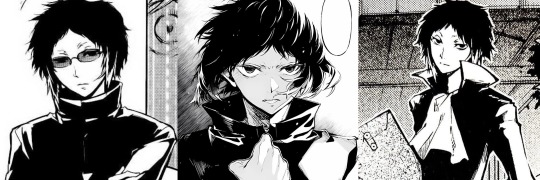
AKUTAGAWA RYUUNOSUKE
ISFP (The Adventurer / Composer ) - Fi > Se > Ni > Te
Akutagawa's dominant function, Introverted Feeling (Fi), reveals itself in his deeply personal sense of morality and the intense emotions that drive his actions. Although Akutagawa often appears cold and ruthless, his actions are motivated by a strong internal value system that he seldom reveals to others.
His need for validation, particularly from Dazai, is rooted in a profound sense of inadequacy and a desperate desire to prove his worth. This internal emotional landscape, characterized by Fi, defines Akutagawa’s motivations and underlies his quest for recognition, even as he grapples with feelings of rejection and worthlessness.
Next, we have Extraverted Sensing (Se), Akutagawa’s auxiliary function, which manifests in his acute awareness of his physical surroundings and his reactive combat style. Akutagawa thrives in high-pressure situations, where his ability, Rashomon, is wielded with precision and adaptability.
His Se drives him to engage with the world directly and immediately, making him a formidable force in battle. This function supports his Fi by allowing him to take swift and decisive action in pursuit of his personal goals, often leading to intense and violent encounters that are driven by his emotional undercurrents.
His tertiary function, Introverted Intuition (Ni), plays a subtler but significant role in his character. While Akutagawa is primarily focused on the present, there is a persistent sense of future orientation in his actions.
His Ni is evident in his long-term goal of gaining Dazai’s approval and the way he internalizes past experiences to guide his decisions. This function supports his Fi by giving him a sense of purpose and direction, even if it is often clouded by his immediate emotional responses.
Akutagawa’s Ni also manifests in his ability to foresee the consequences of his actions, though this is often secondary to his more dominant functions.
Lastly, Akutagawa’s inferior function, Extraverted Thinking (Te), is the least developed and manifests in his occasional struggle with logical organization and external structure. While Akutagawa can be strategic and methodical in battle, his approach is more often driven by his emotions and immediate sensory inputs rather than a clear, logical framework.
His Te surfaces when he attempts to impose order or efficiency in his environment, but these efforts are often overshadowed by his more dominant Fi and Se functions.
This inferior Te contributes to his difficulties in aligning his internal values with the external world, leading to a sense of frustration and conflict when his actions fail to achieve the desired results.
In conclusion, Akutagawa embodies the traits of an ISFP through his dominant Fi, which drives his intense emotional core and need for validation; his auxiliary Se, which fuels his reactive and physically engaging combat style; his tertiary Ni, which provides a sense of direction and future orientation; and his inferior Te, which occasionally struggles to impose order on his chaotic inner world.
His darling: ISFJ - Si > Fe > Ti > Ne
Or ENFJ - Fe > Si > Ne > Ti
ISFJ - (The Protector / Defender)
An ISFJ female darling would be the ideal match for Akutagawa, providing the stability, care, and emotional grounding that his turbulent ISFP personality craves.
Her dominant Introverted Sensing (Si) would offer Akutagawa a sense of continuity and reliability, something he deeply lacks in his chaotic life. Her ability to recall and value the past would help him feel anchored, offering him a safe emotional space where he can reflect on his experiences without feeling judged or misunderstood.
This grounding presence would counterbalance his reactive and intense Extraverted Sensing (Se), allowing him to find solace in a more structured, stable environment.
The ISFJ’s Extraverted Feeling (Fe) would complement Akutagawa’s deeply personal Introverted Feeling (Fi) by helping him navigate his emotions in a more outward, constructive manner. Her natural empathy and concern for others would provide him with the validation and understanding he seeks but often feels he doesn’t deserve.
Through her Fe, she would help Akutagawa express his feelings in a way that fosters connection rather than isolation, gradually teaching him that he is valued for who he is, not just for his abilities or his success in battle.
Her Introverted Thinking (Ti), while not as prominent, would provide a quiet, logical framework that could help Akutagawa make sense of his internal conflicts.
This function would assist in gently guiding him toward clearer, more structured thinking without overwhelming his emotional processes. Her Ti would act as a subtle but important counterbalance to his chaotic internal world, offering a perspective that is both patient and rational, helping him organize his thoughts and decisions more effectively.
Lastly, the ISFJ’s Extraverted Intuition (Ne), as her inferior function, would resonate with Akutagawa’s Introverted Intuition (Ni), fostering a mutual understanding of future possibilities and deeper meanings.
While her Ne is less developed, it would still complement his Ni by encouraging him to consider alternative perspectives and outcomes, subtly broadening his view without destabilizing his primary focus.
In summary, an ISFJ female darling would bring the stability, emotional support, and gentle guidance that Akutagawa desperately needs.
Her Si would provide grounding, her Fe would offer emotional understanding, her Ti would introduce subtle logic, and her Ne would complement his intuitive insights.
Together, these qualities would help Akutagawa find the balance and emotional connection he craves, making her the best possible match for him.
ENFJ (The Protagonist / Teacher):
An ENFJ female darling would be the second-best match for Akutagawa, offering him the emotional guidance and supportive leadership that could help him grow beyond his inner turmoil.
Her dominant Extraverted Feeling (Fe) would provide a nurturing and empathetic environment, allowing Akutagawa to feel understood and valued.
Her ability to connect with others on an emotional level would help him open up and express his feelings, easing his deep-seated need for validation and helping him navigate his intense Introverted Feeling (Fi) with more clarity and compassion.
The ENFJ’s Introverted Intuition (Ni) would align with Akutagawa’s own Ni, fostering a shared sense of purpose and vision. Her ability to see the bigger picture and understand the deeper implications of their actions would resonate with his need for meaning and direction.
This connection would help him focus his energy and emotions on long-term goals, providing a sense of purpose that extends beyond his immediate struggles.
Her Extraverted Sensing (Se), as her tertiary function, would complement Akutagawa’s auxiliary Se, encouraging him to engage more fully with the present moment.
While her Se is not as dominant, it would still offer a playful and dynamic energy that could help Akutagawa enjoy life’s experiences more openly and with less fear.
This would balance his sometimes overwhelming focus on immediate, intense sensory inputs, helping him approach situations with a bit more lightness and adaptability.
Lastly, the ENFJ’s Introverted Thinking (Ti), as her inferior function, would provide a subtle but important balance to Akutagawa’s chaotic internal world.
Though not her strongest function, her Ti would still offer a logical framework that could help him analyze situations more objectively. This would aid in softening the extremes of his Fi and Se, guiding him toward more balanced and thoughtful decision-making.
In summary, an ENFJ female darling would bring emotional warmth, shared vision, and a supportive, structured approach to Akutagawa’s life.
Her Fe would help him connect and express his emotions, her Ni would align with his sense of purpose, her Se would complement his present-focused intensity, and her Ti would offer subtle logical support.
Together, these qualities would help Akutagawa find emotional balance and a sense of belonging, making her an excellent match for him.
#bungou stray dogs#bsd#yandere bsd#bsd fyodor#bungou stray dogs fyodor#fyodor dostoevsky#fyodor dostoyevsky bsd#fyodor x you#dazai analysis#bungo stray dogs dazai#dazai#osamu x reader#dazai osamu#bsd chuuya x reader#bungo stray dogs chuuya#chuuya x reader#bsd chuuya#bungou stray dogs chuuya#chuuya nakahara#bsd analysis#bsd dazai#bsd nikolai gogol#bsd nikolai#bsd akutagawa#akutagawa ryuunosuke#mbti personalities#bsd mbti#mbti#MBTI analysis#bungou stray dogs dazai
134 notes
·
View notes
Text
ok. let's finally talk about this thing i've been wanting to go public with for ages
so i am not a fan of needing THC to help me curb the embarrassment i have in being happy talking about my real realll special interests, because perceived rejection of my interests feels like rejection of myself since i put so much of myself (my time) into them. i anticipate rejection from others because the stuff i find myself occupied with is detached, abstract, highly technical, or niche, and i'm aware of the surrounding cultural assumptions. some of them, and the level at which i am in involved in understanding them, are really specialized or esoteric, so even opening up about them is like "fuuuck im gonna be made fun of or it’s gonna be too technical that they zone out and dont understand why this is so meaningful to me" ive even posted about that feeling before.
see if i start accumulating too much self-context made in my own mind without sharing it i start to feel more and more isolated from other people around me, that they’re not seeing the full extent of what im seeing myself. i don’t share it, because i fear rejection or superficial judgments in other people’s eyes (probably because it’s happened to me and i’ve seen it happen to others). but at the same time it has to be shared with more people around me or else i feel like i have an intestinal blockage in my mind. what happens is my mental colon explodes from all the shit accumulated over time and vou get a post like this. i’m sorry for that mental image btw. anyway back the point of this post
anything where i can systematize archetypes in real, everyday situations has always been my strong suit. so when people ask me my hobbies im like ... uhhh what am i supposed to say? i analyze stuff about the world and rotate it in my mind. when carl jung wrote there are “as many archetypes as there are typical situations in life” i know exactly what he was talking about.
i’ve been toeing the line to really talk about this thing for two years, so let me tell you about socionics. if you already know what im talking about i love you. if you don’t (or even if you do, keep reading there’s probably stuff you don’t know in here), it is part abstract cybernetic model, part jungian concepts, part philosophy of information exchange. it classifies how people communicate and exchange information. it was created in eastern europe in the late 70s, developed primarily in the 80s-90s by other authors and it’s been an endlessly fascinating, elegant, and reliable tool for me.
usually people dismiss personality typology systems because the mbti became so watered down and pop-culturally saturated that people seemed to collectively take a stance of not taking anyone that genuinely cares about it seriously, or at least that’s the impression i got.
(btw — i need to go on this brief rant — i will never forgive 16personalities for being the big five rebranded and people thinking it's mbti. 16personalities gives you your big five type. they explicitly state on their website that they don’t borrow any concepts from jung. -A and -T don’t exist in the mbti and correspond directly to low and high neuroticism respectively. i figured out myself they mapped each letter dichotomy to the other four measures on the big five: extraversion (I/E), conscientiousness (P/J), agreeableness (T/F), openness to experience (S/N). which is stupid and it’s false advertising. take 16p and a big five test see for yourself how they match up. your personal mbti type can be different from its correlated big five type. the actual mbti using jungian concepts as a base is alright though. oh, and the best neo-jungian mbti stuff is by far michael pierce’d takes on it. if you actually fw that heres a carrd i created a few years ago about the cognitive function axes.)
but i always end up going to the bottom of the iceberg in anything i get really into, and i basically integrate it into my own understanding of the world around me for a while. maybe it was because i had a bad experience genuinely talking about it a few years ago from some people who made superficial judgments about it that made me sort of quiet about my interest in typology systems. i assume it’s because myers and briggs used the tool towards racist ends; it acquired negative connotations, bullshit intuition supremacy, and left the study of psychological types tainted in the united states. even if the individual’s study of the system is neutral, unbiased, out of pure curiosity as a way to classify and relate different personality structures to each other, as was the case with me. in addition to 16personalities being an invalid “mbti” test that bought their way to the front page of google, and rampant superficial information at all levels of study, finding anyone who was into it like me was basically impossible. the reason i have a preferred interpretation of jungian + mbti concepts is because i’ve tried different ones on and sensed how well they conform to reality as a way of describing phenomenon, ditching old ones that werent as clear. michael pierce’s i’ve found are the closest to what i sense jung's intentions were. (actually quite likely this is something i would attribute to being because all three of us are types LIl (and also all infj too, how about that?) brain-to-brain communication LII (carl jung) to LII (michael pierce) to LII (me)). so i felt like michael pierce kept the things that worked in real life and ditched the things that didn’t, leaving behind his elegant integration of the concepts.
anyway, i was under the assumption that anything that could be mistaken for it—which socionics often is at a glance—would be dismissed out of hand, even though it’s entirely different. plus, there’s all the context i’d need to clarify about how “it’s different from the “fun” unserious pop-psych mbti and also absurdly more technical” and what's the point in doing that if they don't respect you enough to hear you out anyway? so it just made me closed off.
they share a common ancestor though. the concepts are still based on carl jung’s book ‘psychological types’ which is why there is some shallow overlap, but the scope, structure, and application of it is different. i feel like this system is a lot more “living” and relevant to real interactions and communication between people in our everyday lives. i am always seeing specific examples of these concepts in play in real life and in characters depicted in media. it’s also been more empirically studied and successfully implemented over in eastern europe, and has gone under constant development and contribution. while since the 50s, mbti had crystalized and become stagnant with diverging interpretations to the point where it’s become basically meaningless to try to talk about because nobody can agree on concepts or semantics; there are virtually no distinctions between “schools” or “models” to differentiate interpretations �� (although i have my preference for what i think are the most meaningful and reasonable one; as i said, that goes to michael pierce.) eastern (not so much western) socionics is incredibly more well put-together than mbti or kiersey for squeezing the potential from jung’s original ideas, and goes much deeper. that said, i will ALWAYS advise self-studying typlogy concepts over taking a test. the algorithm of a test can never possibly know you and your individual biases in interpreting the meaning of the words better than the knowledge you just have about yourself. if you learn the theory underlying it you will actually learn about yourself and others and it will actually mean something to you instead of a being an empty decoration for your profile.
here is a comparison chart i translated into english so you can get some idea of where these systems actually differ.
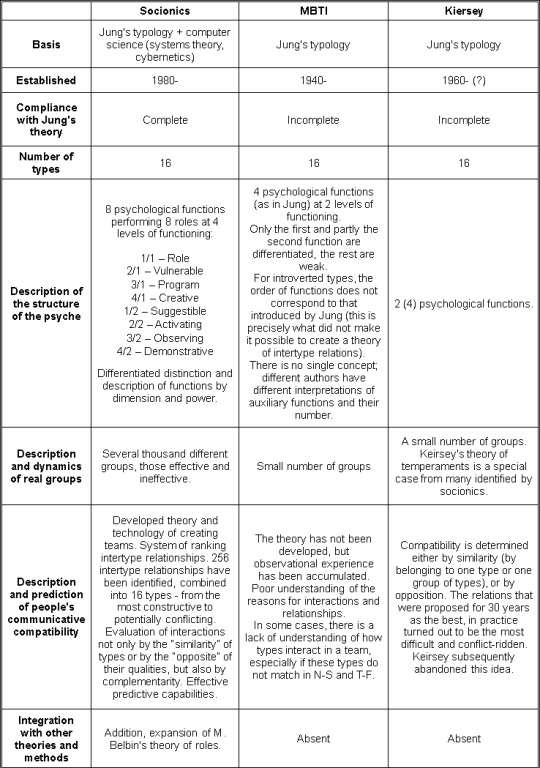
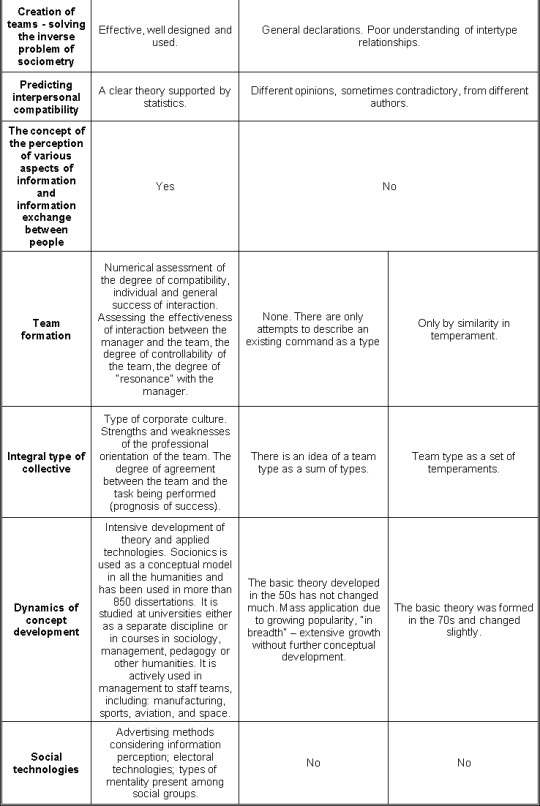
Букалов, А. (2019). On the advantages of socionics over other post-Jungian typologies. Socionics, Mentology and Personality Psychology, (6), 5–7. Retrieved from https://publishing.socionic.info/index.php/socionics/article/view/2603
for me it’s been super insightful applied to real life. it is like a toolkit for interpreting why some people just rub me the wrong way and our communication feels disjointed. or why some people pass my vibe check to enter my personal inner circle and i feel like talking with them is easier and not an uphill battle. who i feel drawn to and want to get to know better. to deconstruct why i and other people interpret information in the world the way they do, and how that explains the kind of people i end up curating in my life. it has put into words the concepts i haven’t been able to find the words for beforehand, and thus enables me to retrospectively pinpoint exactly what unconsciously makes people feel more at ease or why communication is just easier with some and why it’s harder with others, regardless of any other factors. there are other factors of course, that are the result of unique circumstances—nurture, culture, and upbringing—and i of course account for those, it’s not as pertinent to me as the framework that provides the skeletal structure regardless of those individual variations that are simply already a given for me. that was actually the whole point of its creation.
the system gives me a common language to communicate these ideas with, at least to the few people i talk to who have learned it, but i can adapt the concepts in how they relate to specific circumstances and convey it to a lay audience. i’ve been doing just that to explain why, of the people who have been made aware of the hs rarepair john-aradia, i have seen no one object to it, and instead, everyone i saw found it intriguing the more they thought about it, even when they initally thought was “so random”. and i realized, “hey wait! i know how to explain that!”, but that's in another post i've been working on.
[i was actually originally writing this post in the middle of said aradia and john analysis but i felt like there was way too much i wanted to talk about as its own thing. i figured people are going to be reading that post for john-aradia explanation, not public updates about my mind. i just didn’t want to rewrite this to account for the context because the point i made was still relevant]:
but now i’m thinking okay… i’m talking to a bunch of homestucks. why am i prostrating myself here? why am i so defensive? they’re probably creaming their pants at the idea of another symmetrically divisible system of classification to get their hands on. homestuck itself is founded upon a bunch of ideas with symmetrical divisions and classifications (divisible products of 2). aspect dichotomies, quadrants, cards, black-white, yin/yang and literally countless other abstract systems. if there is a common word to refer to these sorts of things, please let me know.
but in socionics terms, all of this sort of stuff i’m refering to would be within the domain of extraverted/black intuition (Ne) information, and classifying or positioning someone within those frameworks would be introverted/white logic (Ti). you can read more about these “elements” here. homestuck has familiarized you with notionally irreducible aspects present in everything, dual yin/yang forces permeating everything, so if you understand all of the sorts of abstract classification systems in homestuck you’re basically already 75% the way to fundamentally grasping model A socionics. it is way more structured and stable than the typologies in homestuck though. but you will perceive there to be similarities in the need for archetypal/thematic sense skills.
if you want to learn socionics, for the love of god start here. there are many weak places out there to start out with that will set you up with a faulty and loose understanding, but school of classic socionics is the best foundation to start with. i saw it emerge from the beginning when it was founded, having been part of it since late 2022.
this is an introduction to SCS, what makes it special, and and how differs from other socionics schools. i find SCS to be the most comprehensive, and i’m active within a side discord to discuss theoretical constructs related to model A. i’ve helped find the links between some concepts in model A that weren’t fully substantiated in augusta’s original works, specifically the importance of the asking/declaring reinin dichotomy, how it fits with regard to the rest of model A’s structure, how it underpins the ring of social benefit (which was missing from her writing), and how it can be used as an information element charge just like positivist/negativist can (i.e. all process types have positive asking Ne (+Ne? and all result types have negative declaring Ne (-Ne!). i’m still working on transfering my essay on that to a document.)
i know the intricacies of this system like the back of my hand but yeah i never post much about it because it’s so niche and i dont know who would even want to hear it besides people who i already know would, like in that small specialist group, but they actually been quiet lately even though i’m still active in there sharing things i realized. and i even feel alienated in most casual socionics discussion groups, especially larger ones. i need people who can match my freak about it.
because i have nowhere else to talk about it i’m starting to feel guilty yapping my friends’ ears off about it when i deconstruct everything i come across in light of this system like i’m being annoying about it. but at the same time when im doing that i am constantly reinforcing the merit of the system in successfully finding some dynamic i see in the drama of real life in connection to some idea from the model. i can immediately lock on to the core principles that are at play in any situation, validating the patterns that have been observed by others. by what measure do these people / characters / groups relate to each other, how do we define the specific “feeling” of the energy between them together? i could do a socionical analysis for anything that captures my interest.
it’s also been incredible for self-insight. i can now accurately explain my thought process.
i can change my perspective of the scope of my thinking on different levels. depending on the urgency of a situation developing around me and my respect for other people’s time, i can expand my reasoning from splitting hairs at the smallest pedantic specifics—although i prefer not to, to the most holistic global hard binary 0/1 (no/yes) judgment.
it’s fractal-like; once i know how to classify and compare the features of something to another, everything else with overlapping logical relationships instantly rises up in the same way, which of course is what leads to me having insights that reinforce the potential inherent in the things around me, because my way of thinking is isomorphic. i also experience strong animated mental imagery accompanying my conscious thoughts about these systems, minimalist shapes or lines of the barebones motion happening. i feel like my mental activity and what i actually write down is trying to capture what im seeing in my head.
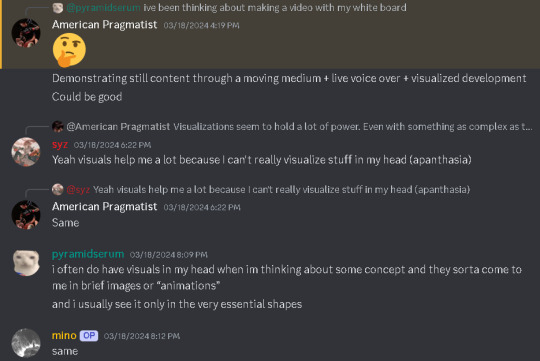
i prefer to be brief, but that requires sharing contexts with someone. once i've established similar ways of talking about the same thing with someone so that we’re on the same page, our messages basically become exchanging code words with each other. all of the potential densely packed into these efficient little terms.
the effect is that i am reducing the amount of time and energy i have to spend trying to explain things to someone. i just want to communicate easily and be understood by the people i talk to so that i can enjoy my time with them. this is why i felt like such a long, clarifying, in-depth post was necessary, which would rip the bandaid off and pull it all up at once, instead of on a private, individual-to-individual level. i had to have it engraved somewhere i could just point someone to instead of repeatedly having to explain the same thing over and over cause that’s a waste of time and energy.
in fact, that revelation i had about myself just now can be explained by model A too! my own type is LIl and this type’s id block houses the information elements +Te! → +Ni?, which aushra describes as “The quality of deeds and actions and the efficient expenditure of energy in work—only performing for what is truly necessary—leads to peace of mind in the future.”
or, for example, coming at it from another angle, here is an older post i made before i was even aware of socionics. i was already talking about my experiences, patterns of thinking and self-awareness in a way that was so on the nose for a socionics analysis.
is that not the clearest example of phase 2’s sensitivity (for me it is information about sensorics)? -Fi? → -Se! superego block, anyone? and did you see how much i gave attention to the time i spend working; +Te! -> +Ni? id block? [information element descriptions here]. you could also derive the progression of the information metabolism stages in my own psyche (phase 1: Ethics -> phase 2: Sensorics -> phase 3: Logic -> phase 4: Intuition).
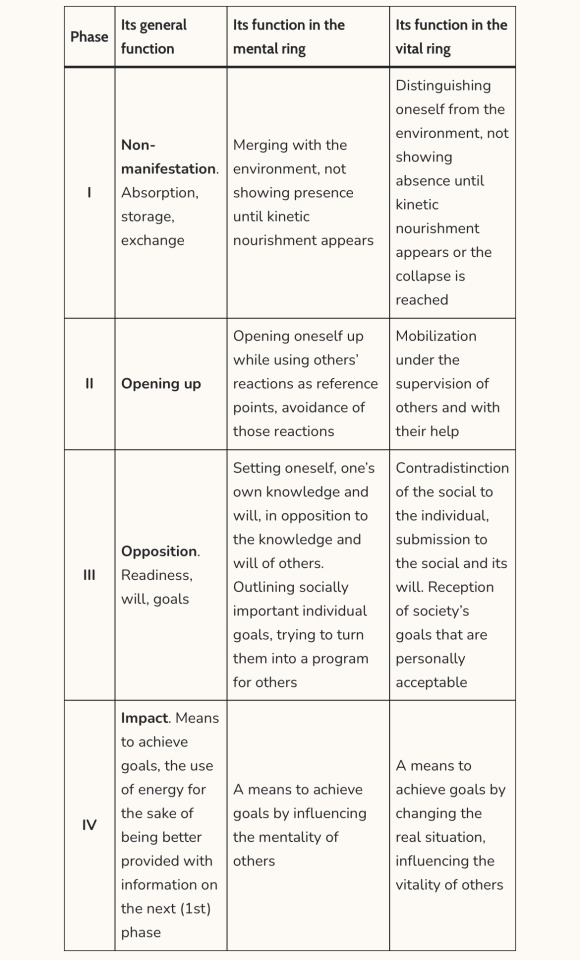
(from The Characteristic of SLI)
so through socionics it’s like i can find an explanation for just about everything i observe in others and myself just because i’ve extrapolated the logical relationships from that system and can isomorphically apply them to anything.
and i don't say that lightly! i'm not saying anything in this post lightly. like i have a degree in biopsychology from an honors college (ncf; yes, the liberal arts college desantis got his soulless hands on because it was “too woke"). having taken courses in statistics, research methods in psychology, and others, i know all about proper research design (and designing them myself). and of course i ended my four years there with my undergrad thesis, examining temporoparietal synchrony in autistic individuals when working alone and together, where for months on end i was doing nothing but reading and interpreting the validity of research papers. i even deconstructed poorly designed psychological constructs commonly used in autistic research in mine.
i also took personality psychology as a course during my time there. i got a birds eye view of most of the popular paradigms and still felt like i was more knowledgeable in the discourse behind some of the topics we glossed over since the course material was more of a broad comprehensive thing than an in-depth one for anything specific. in totality, all of the models i read about in relation to each other seemed so fragmented into different cuts and perspectives in trying to understand and find the patterns in people’s mental life. and yet none of the models i read about hold as as great of an everyday explanatory power as socionics does for explaining ways of thinking, people's proneness to certain tendencies, and the energetic tension that happens between certain people.
people can say otherwise that it’s pseudoscience. even though there are numerous studies built on real-world observations, the large-scale statistical data like from victor talanov. there's school of system socionics who emphasize its practice. it would be impossible to add all the evidence i can to support my claims to this post but you can see for youself - there are still countless new articles being published from different authors. regardless of that, even if it isn't accepted within the rigors of “scientific canon” i really dont give a fuck since it absolutely does indeed have explanatory and predictive power, and that’s all i care about. i’m confident in this not only through firsthand experience, the ability to frame what i know to be true about the real world within it and have it successfully describe those things, as well as talking to other people about my observations.
additionally, i see people make conclusions about interpersonal dynamics where they unknowingly repeat information that can be derived from socionics concepts.
something i noticed a LOT and ive repeatedly thought about and come to the same conclusion multiple times is that i think i naturally might "embody" the most optimal ways of interacting with other people for myself. it gives me insight into the nature of the personal relationships that i already procure in my life, but it’s not really a self-fulfilling prophecy because i dont use socionics to prescribe who i "should" be friends with. that's silly. thats a silly thing to do because people do have idiosyncracies that don't perfectly align with a system if you rigidly adhere to it, so you're bound to be set up for failure if you try to force that and you will be disappointed. it's better to let these feelings happen naturally without pretense, because that's where the observations that fuel my insight comes from.
i have a subconscious sense for who i will be able to get along with in the long term almost instantly without the need for any kind of system, just based on their actual mannerisms and “vibes”, but that alone is not good enough for me, i want to know why. socionics just gives me tools to figure out why so that i know what im dealing with and its not just ineffable energies, but i can put a name to those energies to think and talk about it and compare and discover patterns in what ive curated in my inner circle over my life, what i feel drawn towards. and indeed i do find plentiful amounts of recurring patterns. the simplification and abstraction is not to destroy the soul and expression of individuals but to wrap my head around them and understand them deeper in relation to everything else, including myself.
i am aware it can be confusing for many people which turns them away. but if theres any questions you have or youre confused about any concepts i can answer them
but yeah um, i’ve really only scratched the surface of this cognitive cybernetic tool. if you are genuinely interested in what i have to say and want me to talk more about it please openly tell me since i’m not a mind reader! i assume disinterest by default.
anyway if you got to this point thanks for reading. i wanted to just put it out there for context about any posts i make in the future. just stating my honest thoughts and whats been occupying my mind for the past two years.
be on the lookout for the john and aradia analysis soon where i’ll use it in practice to deconstruct some things about those characters. and if you’re coming to this post from that analysis after ive posted it, i’m sorry this post is so long in the middle of an already long-ish post. i just thought the context was important.
82 notes
·
View notes
Text
Yandere Psychosophy/Attitudinal Psyche
Inspired by yandere MBTI and yandere Big Five. Personality test/self-assessment for this Google document verison of this
Overview
This is a yandere typing system based on the original Psychosophy (also remade as Attitudinal Psyche) system. Originally, it was divided into four aspects: logic, physics, emotions, and volition/will.
These placements are divided into another four placements: 1st, 2nd, 3rd, and 4th. The 1st placement is characterized by absolute, possibly even arrogant, confidence in that aspect and feeling no need to improve or change it. It is very rigid and unchangeable. The 2nd placement, on the other hand, is the most flexible placement. It is characterized by confidence but not arrogance, feeling little weakness in this aspect. To the user of the 2nd function, it is comfortable and easy to use with others and develop further. But the 3rd placement is the opposite. It is the most uncomfortable to use, with a constant feeling of insecurity associated with it. There seem to be two most common approaches to this function: aggressively overusing it or the opposite, neglecting it. This is the placement that needs the most improvement. Finally, the 4th placement is the most underused and is seen by its user as either unimportant or better with a quick fix. These four placements form the foundation of understanding an individual's strengths, weaknesses, and areas for potential growth within this typology system.
In summary...
1st placement: Confident Function (1V, 1L, 1E, 1P) Strong, Aggressive, Monologue
2nd placement: Flexible Function (2V, 2L, 2E, 2P) Strong, Passive, Dialogue
3rd placement: Insecure Function (3V, 3L, 3E, 3P) Weak, Aggressive, Dialogue
4th placement: Unbothered Function (4V, 4L, 4E, 4P) Weak, Passive, Monologue
Yandere System
So what about the yandere system? It follows the same placement rules as the original system but uses its own aspects. The yandere Psychosophy system is divided into four four aspects, respectively: cognition (C), aggression (A), expression (E), and determination (D).
Cognition, equivalent to logic in the original Psychosophy system, reflects how a yandere processes information, plans their actions, and uses their intelligence to manage their obsession.
Aggression, equivalent to physics in the original Psychosophy system, evaluates how a yandere uses power, intimidation, or violence to get what they want or control their darling.
Expression, equivalent to emotion in the original Psychosophy system, focuses on how freely a yandere shows their affection and obsession for their darling.
Finally, determination, equivalent to volition/will in the original Psychosophy system, assess how either determined or fragile a yandere is in achieving their goals with their darling.
Placement Descriptions
Cognition (C)
1st Placement (C1): Exhibits absolute confidence in their ability to strategize and plan. This yandere is highly analytical and methodical, always staying several steps ahead. They see no need for improvement in their cognitive abilities and are often seen as calculating masterminds.
2nd Placement (C2): Confident and comfortable in their cognitive abilities, they can adapt plans fluidly and are skilled at thinking on their feet. They are open to developing their strategic thinking further and are effective planners who work well with others.
3rd Placement (C3): Struggles with insecurity regarding their cognitive skills. They might oscillate between overanalyzing situations to compensate for their perceived shortcomings or neglecting planning altogether. This yandere needs the most improvement in how they process information and strategize.
4th Placement (C4): Minimally engaged in strategic thinking, often relying on intuition or others for planning. They see detailed planning as unimportant and prefer quick fixes or spontaneous actions.
Aggression (A)
1st Placement (A1): Extremely confident in using aggression and violence to achieve their goals. They are unyielding and often intimidate or overpower others without hesitation. Improvement is seen as unnecessary as they view their aggressive approach as highly effective.
2nd Placement (A2): Uses aggression when necessary but with restraint and control. They are comfortable leveraging their power but prefer to balance it with other methods. Open to refining their approach, they effectively combine intimidation with strategic non-violent tactics.
3rd Placement (A3): Feels insecure about their use of aggression. They may either overuse violence in an attempt to assert control or avoid it altogether out of fear or uncertainty. Developing a balanced approach to aggression is crucial for them.
4th Placement (A4): Rarely resorts to violence or intimidation, viewing it as a last resort. They prefer non-aggressive methods and see aggression as unimportant or something to be avoided. They often look for quick, peaceful solutions.
Expression (E)
1st Placement (E1): Highly expressive, openly displaying their emotions and obsession with intense fervor. They are unapologetically passionate, showing no need to alter their expressive nature. Their overt emotional displays are a core part of their identity.
2nd Placement (E2): Comfortable and confident in showing their emotions, they balance expressiveness with control. They can openly share their feelings and are adept at adjusting their emotional displays to suit different situations. They find it easy to develop and fine-tune their emotional expression.
3rd Placement (E3): Struggles with expressing emotions, feeling insecure about their displays of affection or obsession. They may either overexpress in an attempt to compensate or hide their emotions entirely. Improving their emotional expressiveness is a key area for growth.
4th Placement (E4): Minimally expressive, often appearing detached or indifferent. They see emotional displays as unnecessary and prefer to keep their feelings hidden. Quick, minimal expressions are preferred, avoiding deep emotional involvement.
Determination (D)
1st Placement (D1): Exhibits unshakeable determination and willpower. This yandere is relentless and unwavering in their pursuit of goals, seeing no need to alter their approach. They possess a strong sense of purpose and are highly driven.
2nd Placement (D2): Confident and adaptable in their determination, they pursue goals with a balanced approach. They can persist through challenges while remaining flexible. Open to enhancing their resolve, they effectively combine willpower with adaptability.
3rd Placement (D3): Feels insecure about their determination, often fluctuating between intense bursts of willpower and periods of doubt. They may either push themselves excessively or give up easily. Developing a consistent and confident approach to their goals is essential.
4th Placement (D4): Exhibits low determination, often relying on external factors or others to drive their actions. They see strong willpower as unimportant, preferring to go with the flow or avoid direct confrontation. Quick, minimal efforts are favored over sustained determination.
Possible Types
CDEA, CDAE, CEAD, CEDA, CADE, CAED, ACDE, ACED, ADCE, ADEC, AECD, AEDC, EACD, EADC, ECAD, ECDA, EDAC, EDCA, DCEA, DCAE, DEAC, DECA, DACE, DAEC. (First letter is the first placement, second is the second placement, etc.)
Conclusion
That's all! Thank you for reading, and feel free to reblog with the type you think you are or maybe even type a character :D And feel free to send asks or comments if you have any questions.
#azrael currently carrying yandere theory#yandere#yandere theory#yandere blog#irl yandere#actually yandere#bpd yandere#yanderecore#yancore#yandere types#yanblr#yandere imagines#obsessive love#yandere thoughts#yandere aesthetic#yandere community
54 notes
·
View notes
Text
Clover's personality/mbti pt.2
PLEASE REBLOG IF YOU CAN (THIS AND MY PREVIOUS TWO BLOGS ABOUT CLOVER'S PERSONALITY), I WOULD LOVE MORE PEOPLE TO SEE MY UTY MBTI SERIES (TYSM)
When I said Clover has a more of a subjective than an objective train of thought, I also meant this: stealing money and stealing food is not OK in general but it is OK to them. They sure listen to themselves ↓
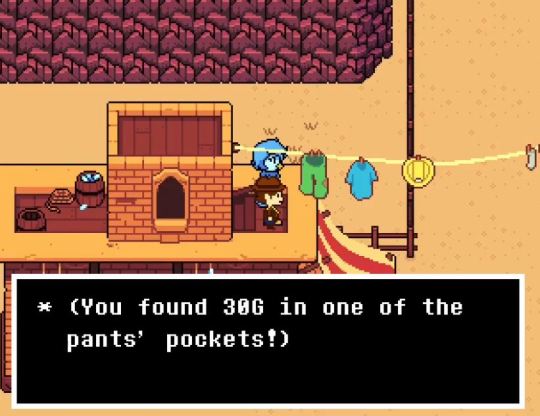
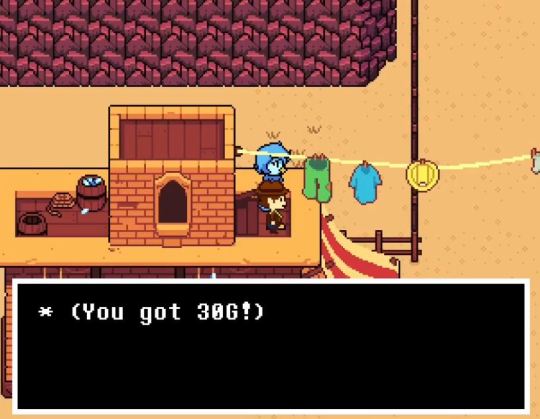
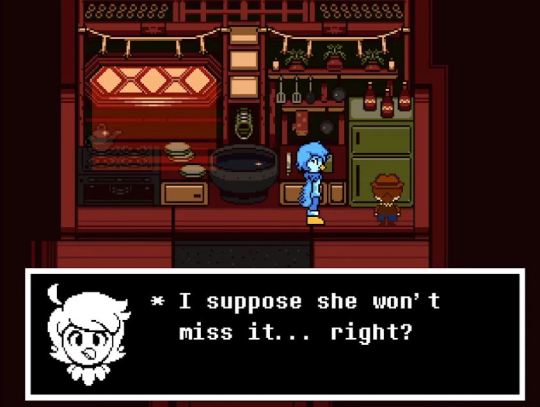
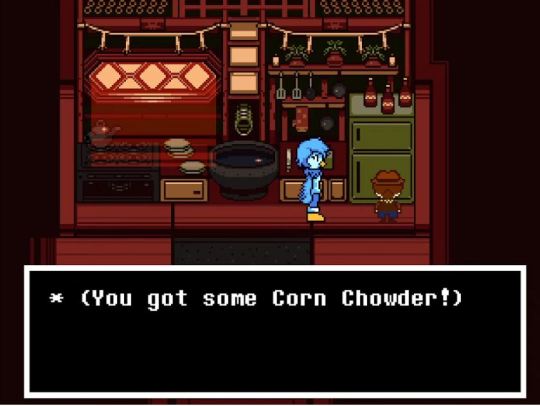
They have more of a creative than a mechanical mind (but in order to deal with a lot of the situations they were in, they had to use their head to survive), look at these ↓
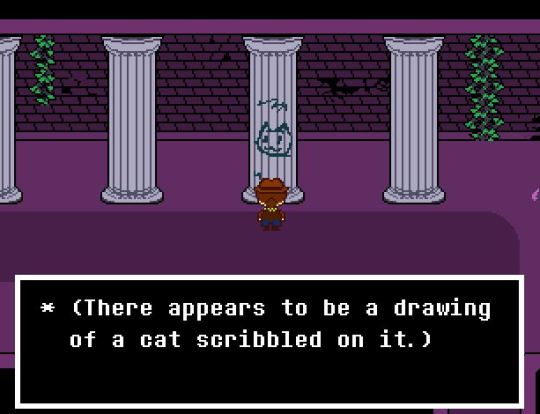
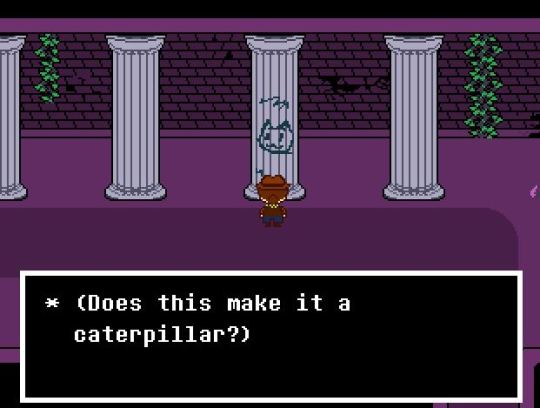
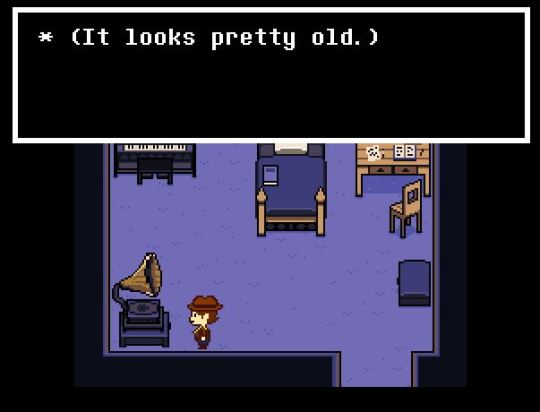
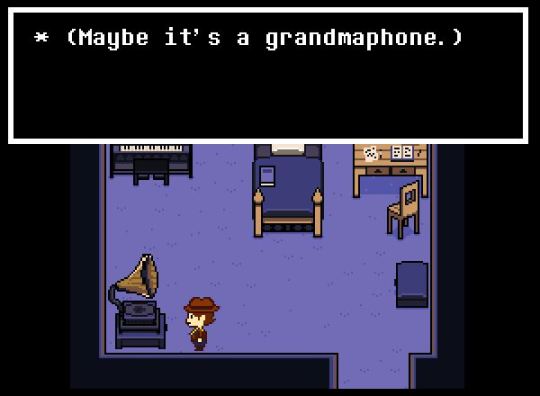
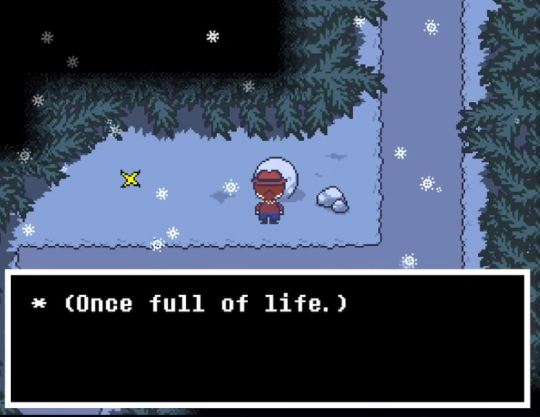
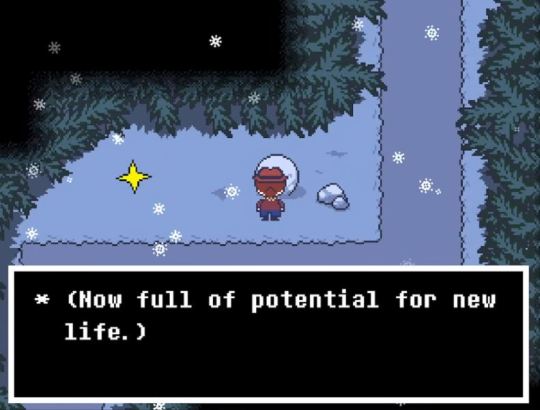
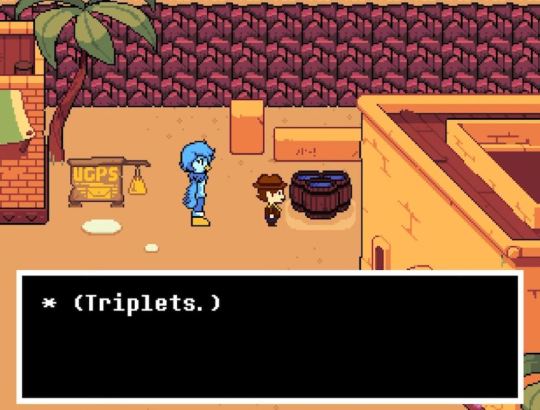
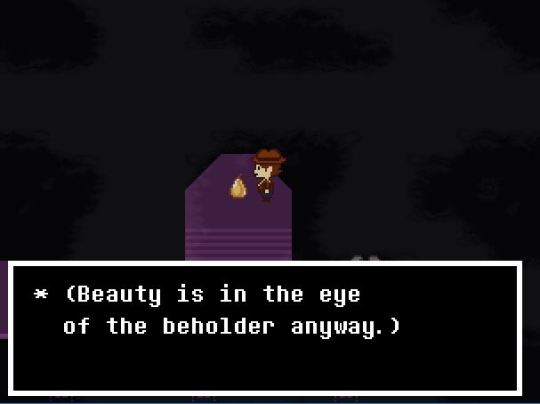
they literally linked this situation with a saying (this is so something an intuitive like myself would do)
Clover's thinking function was more prominent in the vengeance route; their thinking is activated to the maximum here instead of empathy, but it's still subjective since they still have that Fi paired up with Te (see my last post). The sad thing about genocide is how Clover loses absolutely everything that made them who they are in pacifist:
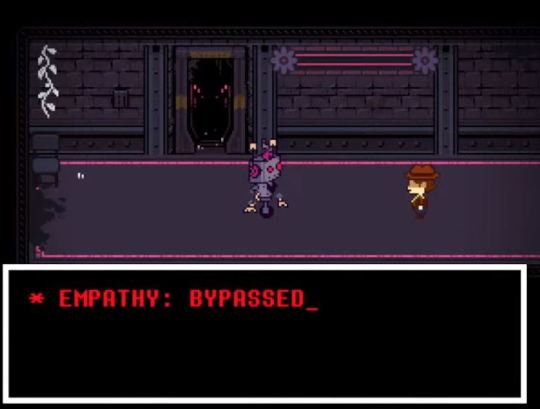
empathy gone

warmth gone (even Flowey feels their heart growing colder)
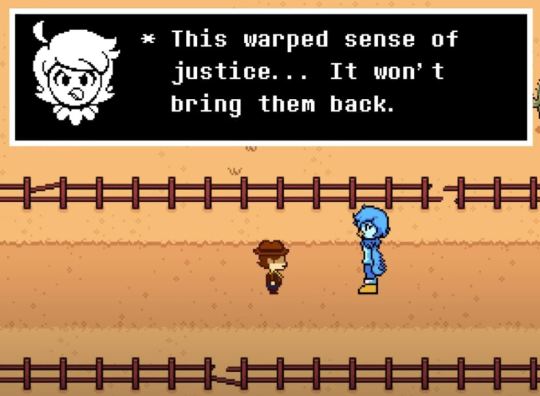
naivety gone
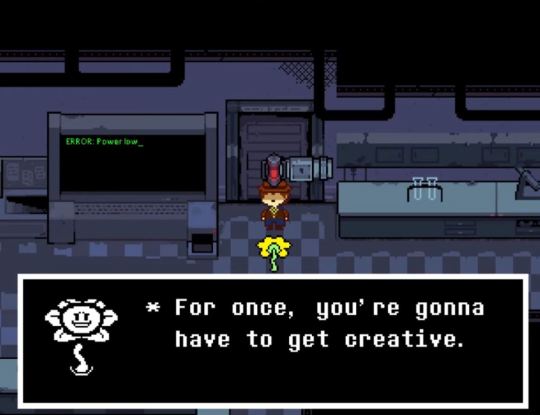
creativity gone
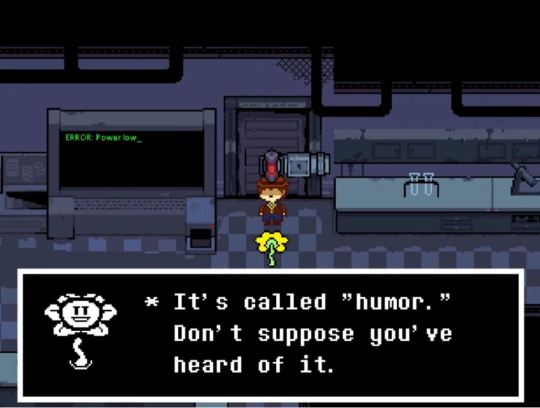
humor gone
Clover has always been kind, so I don't think their auxiliary is Fe. That isn't what needs to develop, or the weakest part about their way of thinking, the one that will shape them into who they were always meant to be.
Because they only felt kindness towards their own race, that's the problem. Clover was judgmental and thought they were doing the right thing, completely disregarding the monsters' side of the situation. Vengenace Clover is the other side of pacifist Clover's coin. This is what I mean ↓
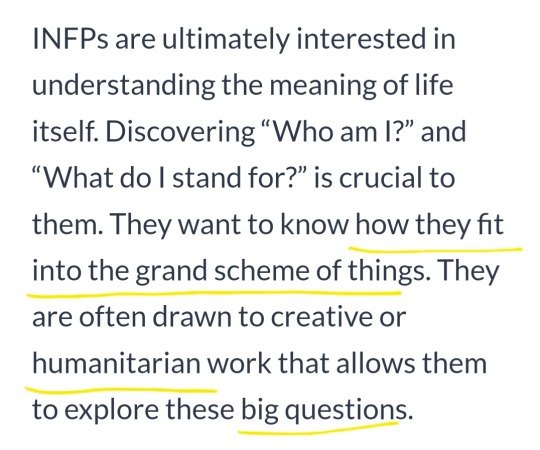
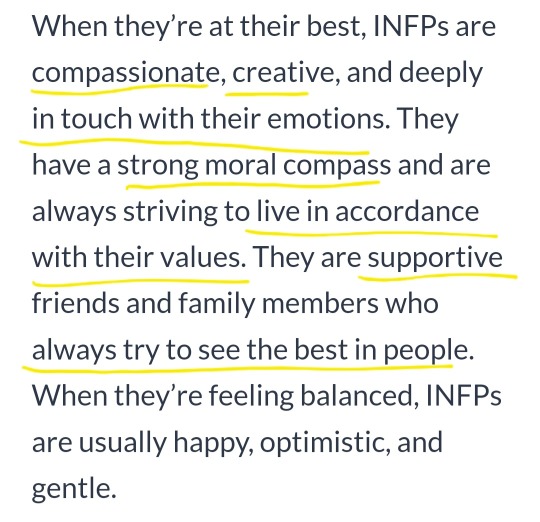
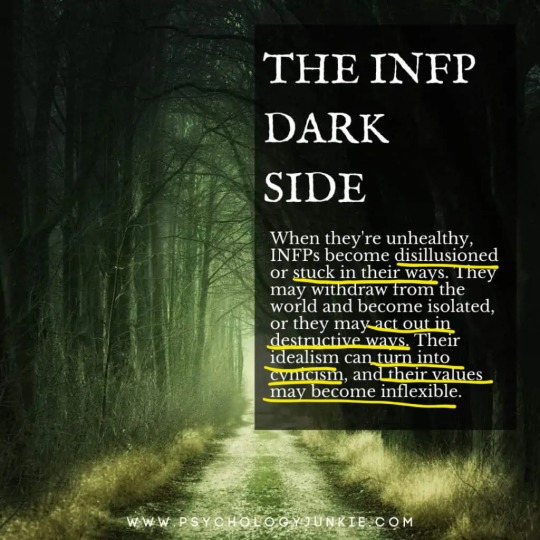
this type of capable of so much kindness but at the same time, if unhealthy, the effect is the complete opposite
That means the Clover in genocide IS the same Clover, but who made difference subjective choices. Whose justice for the children they didn't even know (they, once again, subjectively decided that the children had been innocent, as Martlet pointed out too) was so strong that they refused to see the truth: how both species struggled in this war.
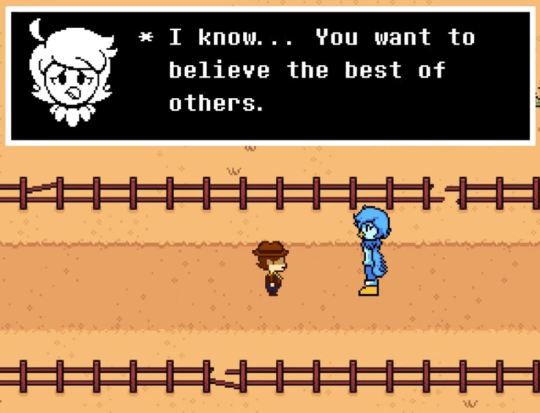
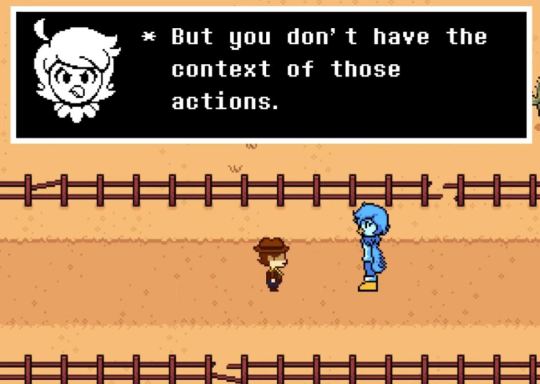
we can see Clover is still "idealistic" but tunnel visioned
"Normal" Clover is open minded, non judgemental and accepting of differences. They can put themselves in others shoes, but in genocide they're the opposite because they gave in to their "dark side" The reason I said they're the same Clover, is that, when I looked at the mbti people gave them, I saw this ↓
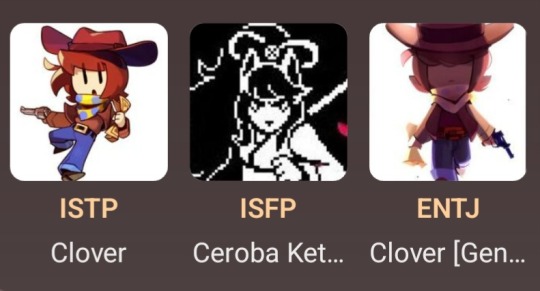
I knew right away it can't be right that the same character is a different type when they're at their best and worst. It had to mean that they're neither of the two types people thought
Clover had been introduced to a lot of different problems they had to constantly deal with and get out of the "comfort zone" that are the Ruins. Toriel undoubtedly told them about the kids, and then Clover decided to stay safe rather than jump into adventure. That's what got me thinking: "Their reason for being here has to do with morality: it is Clover who thinks how it's not right for no one to go look for the children." It's more their own values of what's right, than their own truth. They follow the heart more than the head (although the Te becomes developed as the adventure unfolds and they are faced with difficulties), even in geno (see the previous two posts for more about this point)
To learn to solve real world problems using logic, to step up and take charge, "defuse situations" and "mend relationships" by using both thinking and feeling, to become a leader and a hero, that's Clover's end goal.
Look at Clover from their first run (being protected all their life) and Clover from their 100th+ (faces challenges bravely and willingly dies a hero)

↓
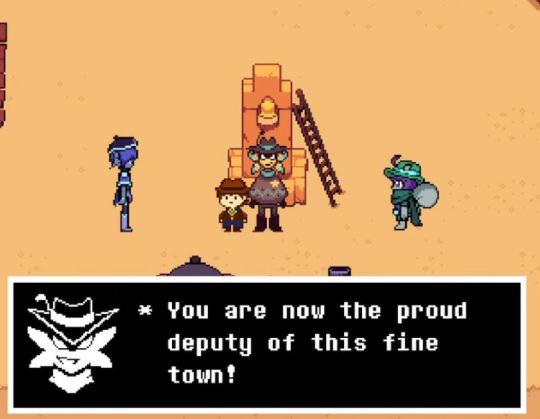
↓
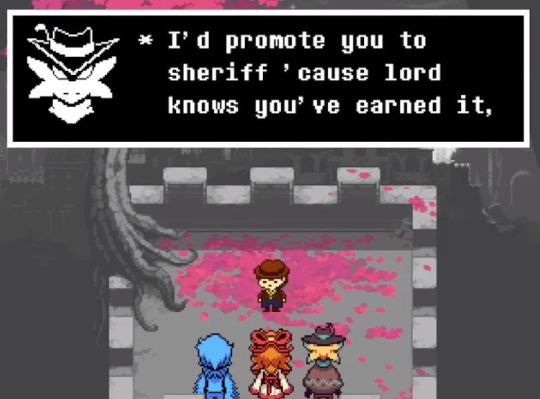
↓
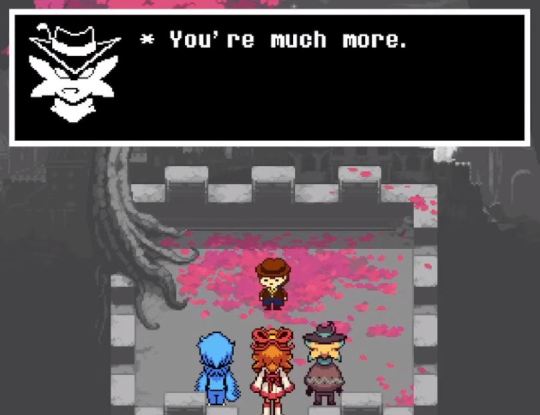
From a scared kid to a deputy to a sheriff to a hero.
#i love making these#still cant believe this has 3 parts already#i did my best to make it as accurate as possible#but im still a newbie with mbti#so dont take my word for it#and yeah the clover section is finished#feel free to suggest who i should do next#uty#undertale yellow#clover uty#uty clover#clover undertale yellow#undertale yellow clover#clover#character analysis#ive tried looking at this from different angles#but i still feel like its less about what happened to the kids (truth)#and more about clo wanting to bring them back home bc its the right thing to do#according to them (values)#doing nothing abt the situation wasn't an option to clover#it wasn't right
50 notes
·
View notes
Text
Stardew Valley MBTI x Enneagram: Shane
Following my last post about the Stardew marriage candidates and their MBTI types, I've been learning more about Enneagram, how it pairs with MBTI, and how it changes some of the typical characteristics of each type.
The Enneagram and MBTI complement each other wonderfully, providing greater depth and understanding of how a person interacts with the world [Cognitive Functions] and their motivations why [Core Desire/Core Fear].
Here are my thoughts on Shane's Enneagram paired with his MBTI.
Shane - ISTP 5w6: “The Troubleshooter”
“ISTP 5w6s are analytical people who lean towards caution. This personality type is curious and passionate about their interests. Because of their wing, they are always cautious and look for all possible flaws before leaping.” – Personality Hunt
Shane’s Core Desire: To be self-sufficient
The core desire of the ISTP 5w6 is to be self-sufficient. ISTPs are naturally very independent and want to make their own way. To achieve this goal, they use their abilities to carve a niche for themselves, and honing their unique skills as 5w6s, they are often very successful.
“My life...It's a pathetic joke...Look at me...Why do I even try? ...*sob* I'm too small and stupid to... to take control of my life…”
"I want to feel like I'm not just a leech on the world. I want to contribute somehow, even in a small way like this.”
Shane’s Core Fear: To be dependent [a burden] on others
The core fear of the ISTP 5w6 is to be a burden on others, especially to those they care about. We see Shane struggle with his mental health and alcoholism through the game. He tries hard to fight his demons on his own, not wanting others to be held back by his personal issues.
It isn't until later in his character development that he learns to be okay with relying on others for help, that there are people who truly care about him, and that asking for their support isn't the burden or 'weakness' he believed it to be.
“I just feel like no matter how hard I try... I'm not strong enough to climb out of that hole.”
"Anyway... I just wanted to thank you for taking care of me. And I want you to know that I'm going to take things a little more seriously from now on. I don't want to be a burden on anyone…"
"You know, I sometimes forget that I really do have friends, people that care about me. And it's okay for me to rely on them... it doesn't make me weak.”
----------------------------------------------------------------------
How Enneagram 5w6 changes typical ISTP behaviour:
New Strengths
1. More Introverted
ISTPs are introverts and ISTP 5w6s are even more introverted. They have a lower social battery than typical ISTPs and need extra time alone to recharge. However, this doesn't mean they aren't assertive. They will put their foot down when they need to.
Examples:
“I hardly know you. Why are you talking to me?”
“What's the point of talking to me? I don't want any friends.”
“...I don't feel like talking to anyone.”
“It's a lot of effort to be friends with someone. It's easier to just be alone.”
2. More Loyal
"ISTP 5w6s are loyal people...Because [type 6] is their wing, ISTP 5w6s will have a measure of loyalty. Their loyalty extends to their friends, family, and even their workplace. While this is true, their loyalty will never be as strong as a core type 6." - Personality Hunt
Examples:
“I... Well, I won't be living here forever, and I wanted to pass something on to Jas. I've been teaching her how to care for them.”
“I guess I've grown attached to Marnie and Jas. We're a ragtag bunch but it kind of feels like a weird family. I never really had much of a family as a kid.”
“I need to keep it together for Jas' sake. I don't want to be a bad role model for her.” “I'm kind of like a father figure to Jas. I just hope I haven't let her down too much.”
“Shane's hard at work. He doesn't seem interested in talking.”
“I may keep to myself a lot, and I may seem unhappy sometimes... but I do appreciate all the work you do. I'm a lucky guy.”
3. More Creative
ISTPs aren't known for being traditionally artistic, but they can be incredibly creative in their own way. This is even more true for ISTP 5w6s. They love to work with their hands and show their creativity in practical ways.
Examples:
"My special blue hens... I've been raising them in secret for the last few months.”
“We'll have the best eggs in the whole valley! Fresh and healthy, with rich golden yolks. Not like those pale, sickly Joja eggs...”
“Sounds great. I'll have to create a bunch of practical effects to make it look cool.”
"Hey! I want you to be in this shot... okay? Just walk by Clint and Emily in the background while they're talking... It'll give the scene a little more authenticity.”
4. More Cautious
ISTPs aren't known for being cautious. Their Extroverted Sensing [Se] makes them more prone to taking risks and testing new ideas. Being Preceievers means they also love being spontaneous. ISTP 5w6s are different. While they also enjoy these things, they are more hesitant and risk-averse than typical ISTPs.
This is because type 5 is interested in self-sufficiency, while type 6 is interested in being secure. They don't want to do anything that risks losing either of these, so they are much more cautious when taking risks or making decisions.
Examples:
“A chicken will never let you down. Humans, on the other hand...”
“It's weird, when I was younger I swore I'd never have a kid. I wonder what happened to me?”
“Hey. Sorry if I came off as rude when we first met. It takes me a while to warm up to strangers.”
5. More Prudent with Spending
Due to their cautious nature, ISTP 5w6s will be less impulsive with their spending, preferring to be more prudent with their finances. However, this doesn't mean they'll be perfect at budgeting or sticking to a budget.
Although Shane spends exorbitant amounts of money on beer and liquor early in-game, once he starts getting treatment for his mental health issues, we see him begin to spend his money much more wisely and carefully, like in his 8-heart cutscene with Jas.
Examples:
"I've cut back on an expensive habit. I have a lot more spending money now!”
6. More Logical
ISTPs are Thinkers, and being a type 5 makes an ISTP's logical thinking even more pronounced. This can have its pros and cons. A positive is ISTP 5w6s can make very sound logical decisions, but on the flip side, they can be insensitive to the feelings of others.
Examples:
“Life isn't fair, and I can't help but feel bitter about it.”
“Do me a favor... when I pass away, use my dust to fertilize some corn for the hens.”
“If I watch more TV maybe I can forget about life. That would be relaxing.”
“Sigh*... If only we could send the kids off to Joja work-camp for a season...I'm just kidding.”
New Weaknesses
1. More Detached
Type 5s are prone to becoming detached if absorbed in their hobbies or passions. This can harm an ISTPs relationship with friends and family if they aren't careful.
Examples:
"Welp... got my year's supply of Vitamin D. Now I can play video games with the blinds shut the rest of the year.”
“Ah... this is the life. No responsibilities, Tunnelers game tonight, fridge stocked with all the goodies a guy could need.”
“If you need to go see your friends in town, go ahead. I'm happy in the company of the TV and a couple of tall boys.”
“Ooo... my throbbing head. How many did I have last night?”
2. Fearful
Type 5 and type 6 are both in the Fear Triad, making 5w6s fearful people. This fear often influences their decisions, and combined with their need for self-sufficiency, can cause them to be stuck in a situation for too long.
Examples:
"You know, Charlie... I was thinking... A guy like me is always teetering on the edge of despair... know what I mean?”
“Here's a chance to finally take control of my life... These cliffs... bu... *blaap*... but I'm too scared, too anxious. Just like always...”
3. Prefer to Play it Safe
"Fear, cautiousness, and worry are all factors that influence their preference to play it safe. This usually means little or no risk and a lot of pessimism. While this has its benefits, the drawbacks are also obvious. ISTP 5w6s will miss out on opportunities and life in general by playing it too safe. - Personality Hunt
Examples:
"Every time I try something new it goes horribly wrong. You learn to just stay in a shell."
“Why try? Life's just a roll of the dice. When they rolled mine, the dice fell off the table.”
“You ever feel like... no matter what you do, you're gonna fail?... Like you're stuck in some miserable abyss and you're so deep you can't even see the light of day?”
4. Lower Energy Levels
Type 5s live in their heads. This, combined with ISTP's dominant function Introverted Thinking [Ti], they spend a lot of time logically breaking things down and reassembling them in their minds. This takes up a lot of energy, making implementing their ideas harder for ISTP 5w6s.
However, ISTPs are still action-oriented and will always strive to be somewhat productive.
Examples:
"Hoo... Feels good to rest these hams. If anyone needs me, I'll just be sitting here, marinating.”
“Buhh... I don't feel like being productive today.”
“Farmer, should I do something useful today?... or just nap forever?”
“I guess... if I had some pants I might've gone outside today... but, nah.”
------------------------------------------------------------------
Conclusion
Due to his substance abuse and mental health issues, typing Shane was more challenging than the others. Though it can be hard to type fictional characters with 100% accuracy, given what we know about his character, how he responds to dealing with his alcoholism and depression, and his personal growth throughout the game, I believe there is strong evidence to suggest that Shane is an ISTP 5w6.
His Enneagram type 5 desire for self-sufficiency and independence, paired with his MBTI cognitive strengths as an ISTP, makes watching his character transform from a prickly, self-isolating man with severe alcohol addiction and spiralling mental health, into a brave, hard-working, and loyal friend/partner to the farmer heartwarming and inspirational.
Do you agree that Shane is an ISTP 5w6? If not, what type do you think he is? Let me know your thoughts in the comments :)
--------------------------------------------------------------------- References:
Personality Hunt: ISTP 5w6 - The Complete Guide
#stardew valley#stardew valley mbti#stardew valley enneagram#stardew valley shane#sv shane#sv mbti#sv enneagram#stardew shane#sdv shane#istp personality#mbti istp#istp 5w6#istp characters#enneagram 5#enneagram 5w6
20 notes
·
View notes
Text
♡Lynette Vega♡


Here it is!! The lore post about my girl!! @aspenm00n @ccstiles
Full name: Lynette 'Artemis' Vega
Nicknames: Lyn. Annette. Pretty bug. Star eyes. Bed bug.
Pronouns: she/her
Sexuality: pansexual/demisexual
Gender: AFAB
Realm: Al'terra
Hometown: Montell
Ethnicity and Race: middle eastern/human
Birthday: 29th of October
Age: 24 years old
Height: 5'5
Weight: 164 lbs
Disorders: Synesthesia and dyslexia
Job occupation: wandering doctor and an altruist for halfbloods.
MBTI: INFP-A
Family members
Believe it or not this girl's family is both alive and healthy.
Lynette was born in a loving home with caring parents and 3 older brothers. They were all followers of Kel.
Her brothers—from oldest to youngest, are: Aayan (33 y/o), Elias (27 y/o), Rowan (26 y/o). Lynette has a strong bond with all of them, they all have occasional hangouts where they catch up on everything they miss.
Aayan is a doctor, he was what inspired Lynette to become one as well. Elias is a temple guard, and Rowan is an architect!
Lynette's bond with her parents, Salma and Samuel, is just as strong as the one with her brother—if not a little more. Her parents were strict but loving, making sure Lyn and her brothers are living comfortably and happily.
Nadia used to be a wandering doctor, but now is a stay at home mother, while Samuel is a famous architect
So yeah—the Vega family is both functional and loving
Important backstory events
TW! Implied SA, slight gore description, and suppressed trauma.
Lynette mostly had a normal childhood, the first major thing that happened..
I. At 7 years old. Lynette and her brother, Rowan, were attacked by a wolf halfblood. They weren't sure if he was drugged or just violent towards humans, all they knew was they were in danger and bleeding profusely. They were both saved by a dawnbreaker, unfortunately it was a little late for her brother—his vocal chords were completely destroyed, beyond saving. Rowan went mute after that, and Lynnette was both guilty and traumatized by this incident..
II. At 9 years old. Little Lyn had to stay with a distant family member that she didn't really...like. It was all going okay, up until the last day. She was stuck in a room with 'snakes' wrapping around her. It felt wrong, it was wrong.
Lynette never felt clean after that incident.
But she never spoke a word.
III. At 13 years old. Lynette meets Tony! Yes, that Tony. It was a slow developed friendship, but a loyal one. They were both great friends to each other, having hangouts every weekend where they pulled pranks, made makeshift jewelry for the other, and gave comfort when one of them was sad.
Lynette also started learning first aid from her big brother, Aayan. He taught her everything he knew, and little Lyn was a very fast learner. Memorising all the medical terminologies in less than a week.
IV. at 15 years old. Lynette officially sets her goal to be a doctor, and help everyone, including halfbloods. Her family was against it..the helping halfblood thing, especially after the incident with her brother. But they let her be, as long as she stays safe, that's what matters.
Her friends were confused about her decision.. especially Tony. Why would you help what hurt you? But they trusted her enough to not get too involved with halfbloods..
V. At 18 years old. Lynette graduated! This was an especially special day in her life! She can finally get started on her medical degree—and she does!
Another event that happened here..a day after her graduation, Tony confesses, and boy was the feeling mutual. And so..Tony and Lynette were officially a couple from then on!
VI. At 20 years old. Her goal to become a doctor was annoyingly slow..so, she decided she'll finish 2 more years, and become a wanderer, only to learn about all the different methods of healing, the different cultures of it. Her parents weren't too worried, her mother did the same thing when she was her age.
VII. At 22 years old. Lynette and Tony unfortunately decided to break up. Their views were far too different, it was like they were strangers to each other rather than lovers. So, they decided to part ways, and pretend they never knew each other.
This was also when Lynnette discovered the sanctuary, they were short on medical supplies and she offered her help—but of course, they were all extremely suspicious of her, but as time went on, she would gain everyone's trust.
VIII. At 23 years old. Lynette meets..Marco.
It was an interesting friendship..a halfblood and a human. Lyn found him injured in a forest, of course she had to help him, and she did.
And slowly, it turned from a friendship to a relationship.
Lil facts about Lynette.
-The nicknames Lyn and Annette were from her parents, pretty bug was from Tony, star eyes from Marco. She doesn't mind which nickname others call her.
however! The nickname "Artemis" was given to her by the halfbloods in the sanctuary. Since she'd take the role of both a protector and a healer for the younger creatures.
-she can speak Arabic! Also very soft spoken.
-she's mostly a complete mystery to all cities and kingdoms in all of Al'terra, but her life story is surprisingly very well known in the sanctuary.
-the scar on her cheek is from when she was attacked by the wolf halfblood.
-the owner of Maria's raven boyfriend /hj
-she still has a good relationship with her family, even after wandering away.
-Lynette is a very shy and quiet person, but she's extremely adventurous.
-Not really a talker, she speaks in actions. But give her some time, and she'll be more open with you.
-she helps halfbloods in rehab, ones who were stuck in the arena and addicted to Malasythe. She's always patient with them, even when getting yelled at and continuously insulted.
-she's very observant of others emotions, reading everyone like a book.
-Lyn's a decent fighter..but really only fights when there's no other choice.
-while very into medicine.. she's also very into poison. Sometimes even making her own special brew of them.
-does not sleep.
-she hasn't met Bodie and Timmy....yet.
-her timeline takes place in the same universe as Warren x Bodie /srs

That's all! For now. I'm definitely remaking this soon after I flesh out her story more.
#my art#Vega lore#i love this little gal#I've been wanting to talk about her for ages#shes my og baby#shes so silly#i love her#marco move over-#she's such a sweetheart#the bug army#gator boys#obsidian lantern
26 notes
·
View notes
Text
Percy Jackson and Annabeth Chase MBTI analysis: The Battle of the Labyrinth.
Annabeth as INTJ
Ni > Te > Fi > Se
Percy as ESFP
Se > Fi > Te > Ni
I think The Battle of the Labyrinth showed their cognitive functions really well. I am actually still doubtful about Annabeth being ENTJ or INTJ, but this book made me think of Se as her inferior function because of how much she questioned Percy for relying purely on it.
Se can work as more of an 'action' function, while Ni inclines more towards analyzing.
Strong Sensing users rely on their five senses, whether it's Si or Se doesn't matter because that description works for both of them. The main difference is that Si is about the past, whereas Se is about new experiences.
Se + Fi combo in Percy is obvious to me. He takes every action he can almost impulsively (or at least that's what it looks like to Annabeth), he trusts Rachel because he has witnessed how useful she was when he found her in The Titan's Curse. He knows she can see the monsters even better than him, so every little and big action and/or decision he takes is based pretty much on his friendship with Rachel; Introverted Feeling (Fi) took quite a bit part of his whole behavior, and the fact that he has Extroverted Sensing (Se) as dominant function just made him decisive, which for Annabeth was recklessness.
During the whole time Percy trusted Rachel "blindly", Annabeth couldn't help but analyze every single future event. Her Introverted iNtuition (Ni) was at its peak, and I can see this when they encountered a new path: Rachel said it was over there, Percy immediately started following her with no previous analysis other than the fact that Rachel helped him (therefore was his friend) and sensed everything much more clearly than him. But Annabeth was very suspicious of Rachel, not because of some jealousy, but because she perceived (N) everything around her and stated that it was a very dangerous path because of how it looked or that they went there before.
She has the ability to connect dots really fast. And in other scenarios where she explains Percy something, he can't catch the hint quickly, but to Annabeth is almost obvious because her thinking (Te - Extraverted Thinking) relies on her perception of things and what will happen in the future (Ni). But Percy has Ni as his inferior function, which I believe, in his case, means that it's not very well developed or he doesn't use it at all times like her.
Taking this last point into account, Annabeth's inferior function (if we follow the idea that she's INTJ) is Se. In The Battle of the Labyrinth she's suspicious of a lot of things and feels at ease when it's something she knows she's good at (e.g: when Hephaestus' spider was leading them and she was terrified, but felt immediately comforted when she had to do a physical thing she's good at — I read it in Spanish idk the translation and I'm too lazy to search it up but ikyk the moment, right?). Obviously, this could look like a strong Si, but because her Ni is showed from the beginning of her appearance (she knew Percy was a kid of the Big Three before he was even claimed). Inferior Se can look like a Si if the person is too ashamed of it, or if it's really bad developed, or if they rely excessively on their dominant and auxiliary functions. I think the latter is Annabeth's case.
I think this book made their strongest cognitive functions shine. Of course I'm not saying Annabeth is indecisive, she's actually a very analytical person who knows when to take risks. Whether she's ENTJ or INTJ doesn't matter a lot to me, but in this specific case I think Se was her inferior function (which applies to INTJ). I also don't mean that Percy isn't analytical, he analyzes things differently. He's not dumb at all, it's just that his way of thinking doesn't primarily rely on connecting dots like Annabeth. Percy is most likely to see the big picture whereas Annabeth looks at tiny details, and I think this is why they are a very good duo and their relationship is well developed even though they are different.
Think about it like a workplace: they are working for the same goal and are put together to achieve it (which is similar to what actually happens, they just happen to want the other to be there most times). Annabeth does take more of an analyzing role, but sometimes her analysis reaches a tight situation where they have to escape somehow, and most "crazy" solutions come from Percy — and he does use his thinking (Te) for that, but has the perception and decisiveness quite characteristic of Sensing users and the fact that he's Se dom just makes him look like a total impulsive person to Annabeth most times, yet she's able to see his reasoning but can feel doubtful of it at times because of how much she tries to predict things.
I think this could be a little confusing for people who don't know cognitive functions... I am willing to answer questions! I also would like to know other people's take on this, but please keep debate in a respectful level (don't find me typologytok).
#pjo hoo toa#percy jackson#percy jackson and the olympians#annabeth chase#the battle of the labyrinth#not tagging rachel because she deserves her own typoanalysis post#intj#esfp#pjo#pjo fandom#typologytok dont find me#mbti#mbti types#mbti esfp#mbti intj#typology#grae's old interests<3#(the old interest being mbti)
22 notes
·
View notes
Note
Hi, I am interested to know 🤔, how would you describe each lower function of the MBTI personality types?
It opposes the natural process In which the Dominant function works. Usually when developing your lower function you get a more whole perspective in the matter.
Si dom (low Ne)
The Si dom is all about using details to create streamlined process that have very strict step by step methods. Developing Ne means they would learn to look at multiple alternatives ideas.
Ex- Susan Pevensie (ISTJ 6w5 so/sp) becoming more flexible when entering Narnia
Se Dom (Low Ni)
The Se dom is stuck in the current moment. They use the current environment around them to make choices. Developing low Ni makes them have more abstract and long term way of thinking.
Ex- Percy Jackson (ESFP 6w7 so/sx) Development when meeting Annabeth
Fi Dom (Low Te)
The Fi dom leads with their emotional values and feelings. They approach every problem they have with how they are feeling. Developing Te makes their focus to be more objective and focus on solving problems.
Ex- Sasuke Uchiha (ISFP 6w5 sx/so) becoming more Te focused as the show goes on
Fe Dom (Low Ti)
The Fe dom navigates life through the feelings and emotions of others. Their main concern is how the social and emotional world Is working in the moment. With Ti developing they become more
Ex- Caroline Forbes (ESFJ 3w2 so/sx) Development in TVD
Ti Dom (Low Fe)
The Ti dom uses their internal world to understand to make logical sense of everything. It focuses on the logistical workings of things rather than function. When developing Fe the Ti dom understands more of what others feel and their emotional motivators.
Ex- Reed Richards (INTP 5w6 so/sp) Understanding his powers and how science benefits the world.
Te Dom (Low Fi)
The Te dom is focused on Efficiency and results. As well as being objective and not letting their emotions get in the way. When developing Fi they become in tune with their emotional self and integrate their emotional self to their goals.
Ex- Victoria Chase (ESTJ 3w4 so/sp) while fighting with Max (INFP 9w1 sp/so) she becomes more in tune with herself and the action she has taken.
Ni Dom (Low Se)
The Ni Dom perceive reality through a very essence based system. Unlike the Si dom the Ni dom is not very rigid about things. The Ni dom can come off as detached from the environment. Developing Se makes the Ni dom more grounded and in tune with the environment.
Ex- Lexi Howard (INFJ 9w1 so/sp) Acknowledging how detach she has been on the second season of euphoria
Ne Dom (Low Si)
The Ne Dom is always looking to explore the environment through ideas and possibilities. They are always thinking of 7 ways to fix a problem. With the development of Si comes a more grounded and methodical way of thinking.
Ex- Stiles Stilinksi (ENTP 7w6 sx/so) figuring out mysteries with Lydia Martin (ESTJ 3w2 so/sx) grounds him to more methodical approaches.
#mbti#mbti personality types#zodiac#zodic signs#personality typology#typology#ennegram#16 personalities#personality types#enneagram#infp things#infp personality#isfp personality#mbti isfp#isfp#entp personality#entj mbti#entj personality#entj#mbti estj#estj personality#estj#estp#esfp characters#esfj mbti#mbti esfj#esfj#mbti istj#istj personality#istj
24 notes
·
View notes
Text
How to Interpret Sakinorva MBTI Test Results
Introduction
People (myself included) often recommend the Sakinorva Cognitive Functions test to help them determine their MBTI type. This test determines which functions you're using and how strongly you use them. Based on this information, it will suggest some MBTI types that you are likely to be based on a few different methods of analysis (described later).
This is test provides a wealth of information and data that can be used to discern your type, but it can still be a little confusing interpreting all of these results. And despite how well thought out this test is, like all MBTI tests, it is imperfect and subject to error, further suggesting that the best way to determine your type is through knowledge of self, and knowledge of cognitive functions.
As someone who has studied MBTI for many years, I am confident in my type being an INTP, but even with this confidence, my top test results was not INTP.
Here, I will analyze my own test results and discuss some common points of confusion that people encounter like if your results indicate that you strongly use some cognitive functions that are different from the function stacks outlined by Myers and Briggs for the type you've been assigned. For example, you're an ENFJ, but your results indicate that you strongly use Ni (expected), and Ne (unexpected). I will explain how to interpret results like these, and other confusing examples, as well!
Results & Discussion
Figure 1.
A screenshot of my Sakinorva test results.
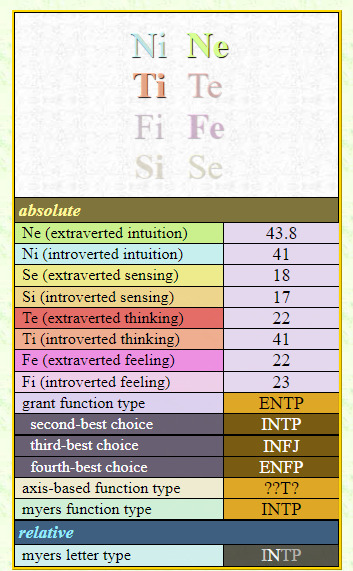
We see that each cognitive function has been assigned a number that has been calculated based on how strongly I preferred to use that function. The higher the number, the more strongly I preferred the function.
The first step I take when interpreting these results is to first put the functions in order from most preferred to least preferred to see if the order resembles any of the known function stacks for any of the 16 types.
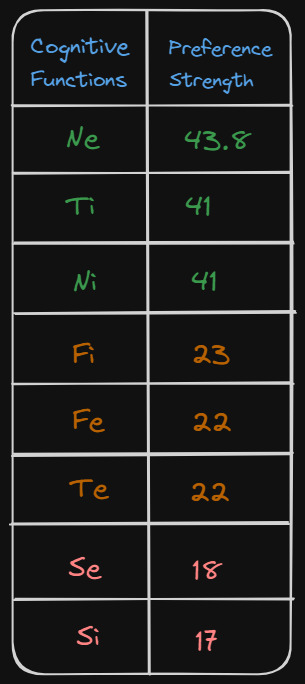
Grant/Brownsword Function Type Results
The Grant/Brownsword model - though untrue to Grant's definitions for the types and their functions in From Image to Likeness: A Jungian Path in the Gospel Journey and those of Brownsword's in It Takes All Types! and Psychological Type: An Introduction, this test tries to reconcile the type development stack first proposed by Grant with the more Myers-centric (as opposed to Jung-centric) definitions for the functions used by the typology community today.
Best choice: ENTP
From here, it's pretty clear that my top cognitive function is Ne, with Ti and Ni coming in a tie for second. My top type result is ENTP because the strongest cognitive functions for ENTP are Ne and Ti in that order. This just goes to show that even some of the best tests you can take can still give you an incorrect result. We'll talk about the high Ni in another section. Granted, the second-best result is INTP, which is my actual type, but if I was new to MBTI and didn't know my type yet, I wouldn't know any better!
The full ENTP function stack is Ne-Ti-Fe-Si. Looking at the preference values, we see that on this test, they did manifest in that order of strength/preference 43.8-41-22-17. This information in combination with my very clear preference for Ne and Ti over most other functions is why the top result was ENTP.
Second-best choice: INTP
The INTP function stack is Ti-Ne-Si-Fe, which is very similar to ENTP (same functions, slightly different order). INTP is suggested as the second-best choice because my Ti-Ne and Si-Fe preference values are very close in number, that if I retook the test again, it is reasonably likely that the order of preference could change to reflect the INTP order of functions. Because I have studied MBTI for some time, I know that this is actually the case, and that for whatever reason, I was feeling particularly perceptive (as opposed to feeling more decisive) when I took this test, and scored slightly higher on Ne instead of Ti as a result.
Third-best choice: INFJ
Now this is suggested because I tested as having high Ni in addition to high Ne and high Ti. Because INFJ’s function stack is Ni-Fe-Ti-Se, there is a (weak) argument that can be made for me being an INFJ because the high Ni coupled with Ti could indicate an INFJ who is skipping over their auxiliary Fe (aka a “jumper type” as I’ve heard them called). This is less likely because INFJ’s naturally use high Fe and my Fe scores as low as Te and Fi which aren’t even in the INTP function stack.
This is a confusing hurdle that a lot of people come across with function tests. How can you score high in Ne and Ni? Or high in Ti and Te etc.. This is because when answering questions, you will still tend to prefer the function that aligns with your dichotomy as opposed to its opposite. I do not typically use Ni according to my function stack, BUT given the choice between Ni and Si or Se, I will always choose Ni because it is more similar to Ne than Si or Se are. So if you take one of these tests and score high in both extroverted and introverted forms of the same cognitive function (aka opposite attitudes of the same function), it is most likely that you prefer only one of them, and scored high in the other as an scientific artifact
Fourth-best choice: ENFP
ENFP's function stack is Ne-Fi-Te-Si. I received this result most likely because the test indicated Ne as my strongest function (and Si as the weakest). Since ENFP is the only type other than ENTP with this cognitive function pattern, ENFP is a natural fourth choice. I scored very low on both Fi and Te, which is why ENFP isn't higher on the list of possible choices.
Axis-based function type: ??T?
The axis-based model - this algorithm uses preferences for function axes to arrive at a type, a practice commonly used by magicians and typologists today.
Honestly, why it was only able to type me as a thinker and nothing else is confusing to me. I had exclusively high Ti, so it seems like it should be able to type me as an xxTP. I can see why it would struggle with typing me as xNxP based on the Ne-Si function axis or as xNxJ based on the Ni-Se axis because I had both high Ne and high Ni according to these results. There is very little information about this typing method outlined on their website
Myers function type: INTP
The Myers model - this algorithm stays as true as possible to how Isabel Myers had envisioned function orientations in her types, especially emphasizing the importance of the extraverted functions in determining type. (I may later expand on this in the FAQ.)
It is unclear to me how I received INTP as a result if it is based off of the Isabel Myers' interpretation with the order of function stacks that I have been outlining through this guide so far, especially since Ne was my strongest function in these results, and therefore, should be ENTP. Perhaps I have misunderstood these results somehow. Either way, this is another example of how there is often confusing/contradicting/incomplete information regarding cognitive functions and the tests that measure them.
Myers letter type: INTP
The Myers letters - this test also attempts to calculate your '16 personalities' type through a careful examination of each question and how it would correlation with each of the eight preferences; though roundabout and based only on theoretical correlations, it is reasonable to assume that this result will be more accurate than the previously mentioned algorithms in determining your Myers letter type.
I do not remember how I answered questions that only tested the letters instead of specific cognitive functions, but it appears that I at least answered enough introverted questions to receive INTP for this result. Not much more can be said about this because Fig. 1 only shows the strength of specific cognitive functions, not the metrics for the 4 possible letters.
Conclusions
While this cognitive function test is considered one of the more reliable ones, there are still some limitations including question-phrasing and user-error that can produce inaccurate results even for someone like me who has been studying MBTI for many years who already knows their type.
Test-related Error
Questions measuring the same function with opposite attitudes to both be strongly used because they are being compared to the opposite function of both attitudes that are likely both weak functions. In this example: High Ne and Ni because I always chose intuitive perception of sensing.
User-related Error
Answering questions based on how you currently thinking/feeling, instead of your overall established pattern of thinking/feeling over the course of your lifetime.
Answering questions based on how you would like to think/feel, instead of how you actually think/feel
Over-thinking what a question is asking and answering it in a way that does not reflect your true attitude because you've misunderstood the prompt.
All in all, if you can minimize the user-related errors by getting to know yourself, being honest with yourself about who you are, and answering questions based on how you initially interpret the question before you can overthink it, then you should be able to get a mostly accurate MBTI result.
While INTP may not have been my best choice according to this test, it was still my second choice, so if I truly didn't know my type at this point, my true type was listed as number 2, which is pretty good, overall! It would just require a little bit of introspection on my part and learning more about the functions to come to the most accurate conclusion myself.
25 notes
·
View notes
Text
OC: Paisley Gallos

Basics:
Full name: Paisley November Gallos Nickname: Pais Gender: Female Species: Witch / Vampire Date of birth: December 14th, 1874 Nationality: Spanish-French, born in the Americas Blood status: Muggleborn Wand: Walnut, dragon heartstring, 11”, unyielding
Appearance
Hair colour: Dark brown / mahogany Hairstyle: Short, wavy Eye colour: Hazel Skin tone: Medium Height: 5’2” Body type: Average, slight muscle definition
Clothing style: Functionality takes priority; light-medium, but durable fabrics such as cotton and leather for ease of movement. Prefers more fitted clothing, especially when travelling or exploring outside the castle walls. Fond of worn denim; often wears her brother’s hand-me-down pairs when out of class.
Accessories:
Often carries a harmonica in her back pocket
Her father’s wristwatch, despite it always running a few minutes ahead
Other distinguishing features:
Three diagonal scars on the left side of her jaw (obtained while trying to escape from a vampire)
Two small birthmarks below her bottom lip

Personality
Traits: Intelligent, resourceful, clever, determined, crass, blunt, intuitive, curious, decisive, quick to anger, observant, goal-oriented, remorseful Likes: Early morning hikes, writing in a new notebook, solving problems, the ocean, strong coffee (with two sugar cubes), stargazing, foraging for minerals/rocks Dislikes: Perfume, wet socks, the afternoon sun, formal attire, dishonesty Hobbies: Fishing, metalsmithing (when out of school) Fears: The unknown, her own thirst (once she becomes a vampire)
MBTI: INFJ-A Zodiac: Sagittarius sun, Aquarius moon, Libra rising Temperament: Choleric Archetype: The Rebel Similar characters: Remus Lupin, Albus Dumbledore, Sam Winchester, Harry Callahan, Lisa Simpson, Han Solo, Max Mayfield, Jon Snow

Family/Friends
Father: Pierre - Muggle, Fisherman Mother: Rosalyn - Muggle, Teacher (Died in 1882 from scarlet fever) Sibling(s): Mathieu (age 19) Pet(s): Barred Owl, “Crispen” Friends: Sebastian Sallow, Ominis Gaunt, Garreth Weasley, Amit Thakkar, Natsai Onai

Magic
Boggart: Extremely thick fog, accompanied by a foghorn Patronus: Colossal squid Polyjuice: Turns crimson, tastes like spring water and copper Amortentia: Smoke, bergamot and clean, starched cotton Special abilities:
Fire-based offensive spells and charms
Non-verbal magical spells
(Once transformed into a vampire) can sometimes "absorb" a person's abilities after consuming their blood

Backstory
Born in Nova Scotia, Canada to immigrant muggle parents, Paisley grew up in a small fishing village just on the outskirts of a port city. Because of this, she spent many days on fishing vessels with her father and older brother, while her mother worked as a teacher at the schoolhouse in town. When she was eight, her mother fell gravely ill and unfortunately passed away from complications of scarlet fever. Her father, Pierre, often struggled to balance work obligations with raising Paisley and Mathieu, and more often than not her older brother was left responsible, which caused her to develop a great deal of independence.
Being from a non-magical family, Paisley's magic was a startling discovery. It revealed itself when, while arguing with her brother, she made a milk bottle spontaneously explode in frustration. The following morning, two members from the Ministry for Magic arrived, explained magical abilities to her and her family, and promptly enrolled her in the Ilvermorny School of Witchcraft and Wizardry.
She was sorted into the Horned Serpent house, based on her high level of intelligence and ambitious, goal-oriented mindset.
Paisley excelled in her studies, her hunger for knowledge consistent, and while graduating from her fifth year she was recognized for her advanced magical comprehension. She was hand-selected by the Minster for Magic himself to take part in an accelerated graduate program at Hogwarts School for Witchcraft and Wizardry, and with great excitement she transferred at the start of her sixth year. Having researched the Hogwarts houses before her arrival, she anticipated being sorted into Ravenclaw... however the mysterious rumours about the Slytherin house fostering several dark wizards in history captivated her curiosity, and thus the sorting hat placed her there instead.
Soon after arriving at Hogwarts, she was captured by a well-known criminal, who subsequently bit her and changed her into a vampire against her will. The details around this, and why she was selected specifically, are still unknown...

Academics
Best subject: DADA Favourite subject: Astrology Favourite teachers: Professor Fig, Professor Sharp Worst subject: History of Magic Least favourite subject: Divination, Theory of Magic Least favourite teacher: Binns Quidditch: N/A
As a student:
Prioritizes her studies as much as possible; she is aware of the once-in-a-lifetime opportunity to study at Hogwarts and does not take it for granted.
Sometimes misses classes without explanation, particularly on sunny days.
She is always happy to help fellow classmates, however, she is wary of many. This only increases once she has been turned.
Mostly keeps to herself; has few, close friends, with whom she places a great deal of trust.

Future
Career: Researcher or Archivist Naturally, Paisley is drawn to a career path that allows her the opportunity to further her education and learn something new. Her ambitions focus on filling her brain with as much information as possible, so taking up a job as a Researcher or Archivist for the Ministry is very much in her wheelhouse.
Spouse: TBD Children: TBD
Special thanks to @hazyange1s for letting me follow their OC layout 🤍
#hogwarts legacy oc#hogwarts oc#hogwarts legacy#hogwarts legacy mc#hogwarts legacy fanfic#ominis gaunt#amit thakkar#sebastian sallow#garreth weasley#natsai onai#the stratagem strain#oc profile#paisley gallos
36 notes
·
View notes
Text
Ponyboy & Darry Curtis: The Exploration of a Relationship Between an ESTJ & INFP.
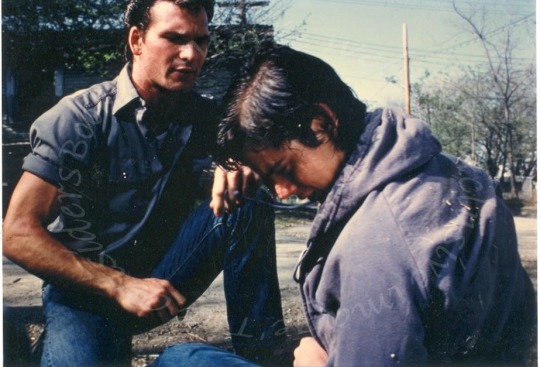
I feel like if there’s two types I see the unhealthiest relationship between, it’s INFP & ESTJ, and honestly there are so many characters I could have used for this analysis, but I feel like this one is the most classic examples.
Also, this isn’t to say that an ESTJ & INFP couldn’t get along, but given their contrasting personalities, it would take a lot of effort and may be difficult to do in a traumatic environment, especially the one the Outsiders sets up.
Note: To be honest, I was kind of surprised this won the polls until I remembered the musical came out recently.
Fi-Te vs. Te-Fi

Essentially, ESTJ and INFP, have the same traits, just a different order. So each of their dominant traits is the other’s inferior traits.
In the case of Ponyboy and Darry, their personalities clash because of their inability to develop the lower traits in their stack, as well as the way they react to traumatic events. In the death of Johnny and Dallas, Ponyboy begins to dwell on his feelings a lot, and pretty much shuts down, while Darry’s default is to push his emotions to the side, and he kind of expects Ponyboy to do the same.
Darry has a very logical approach to life, and gets frustrated at Ponyboy’s inability to think things through, a criticism Ponyboy eventually does choose to accept about himself. On the same hand, Darry’s insensitivity, and need to push his own emotions aside does create a rift between himself and Ponyboy.
Ne-Si vs. Si-Ne

As the “middle traits”, these usually are the traits that would help the two find middle ground, however, it seems to create a bigger rift. Ponyboy is constantly criticized for being trapped in his own world, so much so that he ignores the world around him, and ends up getting hurt.
His Ne, on the other hand, can be his greatest strength. He is the narrator, so we see the world from his lens, where he is critical of the society around him, and thinks of alot of “what if” scenarios, and is able to connect alot of things to what he’s read.
Darry often gets confused when he is able to do well in school, but not apply that to real life. He uses his Si, and his Ne to fuel his ideas, and to help him do well in school, but he is unable to use it in his real life. Ponyboy gets so distracted by his dominant functions, that he sometimes ignores his lower functions completely.
But when Darry uses his dominant functions, or pushes his emotions aside, Ponyboy sees Darry as being harsh, when really, he just wants what’s best for him, and to him, that is taking a logical approach to things. Being more firm, understanding his surroundings so he can protect his family.
The ENFJ Mediator

A huge part of the book, is the fact that the middle brother, Sodapop, is the mediator towards the brothers. As far as MBTI goes, he has none of the same cognitive functions as the brothers, but his stack shadows Ponyboys.
Still, Sodapop wants nothing more than group harmony, and usually takes in the emotions of everyone else before his own- which ends up being to his own detriment. Both brothers have trauma, and struggle with acknowledging their lower traits.
Darry has trauma from having to give up everything to raise his younger brothers at a fairly young age. Ponyboy has trauma from also losing his parents, and then… pretty much everything that happened in the book, from almost being killed to having to be on the run to the fire, and then watching two of his closest friends die right in front of him.
Because of this, Sodapop never gets a chance to process his trauma. He also lost his parents and had to drop out of school to help Darry. He watched his brother run away, and the next time he heard from him, he was in the hospital after being inside a burning building. At the end, he is the one who tells them what they need to here, and this also allows him to open up about his own feelings.
31 notes
·
View notes
Text
Anon wrote: Hi mbti-notes, I don’t know what to do about my long time friend, so I reach out to you for help. Your insights are always spot on and I want to thank you for this blog, I’ve learned a lot thanks to you. I’m xnfj, my friend is infp and likely autistic, we’re both 27.
She is really sweet, but I feel confused. The thing is that she doesn’t greet my family or people in general. When we were younger, it felt so surreal that I didn’t know how to react – so I ignored it even if it made me feel terrible. Later I asked her multiple times to greet at least my family members, as it makes me feel weird, she started greeting but only sometimes.
Not only she won’t greet first, but even when someone greets her, she won’t reply, which feels extremely inappropriate, especially when it is my family. It happens all the time when we go places, she won’t greet the host, etc. When I asked her why, she said it costs her too much energy to say hello.
Recently, me and my parent ran into her twice on the street. One time I think she was pretending not to see us, the other time she said hi only to me and quite literally ran away. (Yet I know that saying hi is not such an issue for her when it comes to people she likes, that’s when shouts hello even from across the street, which makes me feel twice as offended – to see this extreme difference of behavior towards some people that oftentimes she barely knows.) Then she acts as if nothing happened. Anytime I touch the topic, she denies it, explains it etc. and doesn’t understand that her behavior affects others – or she just doesn’t care.
I understand that with autism greeting can be difficult, but it doesn’t work for me – also when I made it clear that it makes me really uncomfortable. I feel like I have accommodated a lot of her issues out of friendship, so I am taken aback to see it is one-sided. I really wish we could continue being friends but I can’t imagine hanging out with her without feeling angry deep down.
And even if she started to greet, I would feel like it is forced and insincere. So my question is, what do I do? I am so confused and full of conflicting feelings. Break up? Distance? Explain myself? Or not? If you have any insight, I will really appreciate it. It’s been a month that I haven’t talked to her as I literally don’t know what to say or do. Thank you so much in advance and wish you a pleasant weekend!
----------------------
You say you understand that it "can be difficult" for her but it doesn't sound like you actually do understand. You might feel bad to hear that, but this is not about assigning blame. I'm attempting to pinpoint the source of the problem in order to discover the best solution. As far as I can tell, there are two aspects to this problem:
Problem #1: Lack of Understanding
When someone's psychology is very different from yours, it's going to be very difficult for you to understand each other, because the other person's experience is simply too alien to "make sense" to you. I always say: Just because it doesn't make sense to you, doesn't mean there's no sense to be found. This huge gap in understanding is not an insurmountable problem, but it is a significant challenge to grapple with. It requires you to push your empathy skills to the max.
Autism spectrum disorder (ASD) is a neurological and developmental disorder. "Neurological" means that a person's brain is literally wired differently than the average neurotypical person, which is why we use the term neurodivergent to indicate the difference. "Developmental" means that typical psychological development is somehow interrupted, so autistic people will exhibit some deficiencies in information processing and difficulties with everyday functioning.
Perhaps an analogy can make it more clear: Imagine that a friend was diagnosed with muscular dystrophy and was gradually losing muscle mass and control of their lower body. Even though they can still walk, they need a wheelchair most of the time because it quickly becomes painful to use their back and legs. Would you say to them, "Hey, I'm throwing a big party and since you can walk, I hope you will stand up and greet every person properly when they arrive at the door, otherwise they'll think you're rude and I'll feel uncomfortable and embarrassed by you"? I hope you would never dream of placing such a demand on someone with a physical disability.
A neurological and developmental disorder is not as visible as a physical disability, but it is just as real and can be just as painful. There are certain kinds of information that autistic people simply cannot process very quickly or at all, which means that their mind can easily get overwhelmed by sensory/information overload.
Unfortunately, being different from the norm, whether physically or psychologically, presents a lot of challenges in life. Since you've never had to deal with the kinds of challenges your friend faces, it might be hard for you to understand just how difficult it is to live in a world that not only doesn't accommodate you but actively pressures you to erase yourself. You are very lucky to have the ability to learn and adapt well in social situations. Please recognize that not everyone is equally endowed with this ability at birth.
New situations, by definition, present more unknowns, which makes them more unpredictable. Meeting someone new, in an unexpected time or place, means there's a lot more information to process and keep track of. In the best case scenario, an autistic person can push themselves through a new social situation with certain coping strategies, but it will exhaust them and perhaps ruin their day. In the worst case scenario, they will get overloaded and experience a mental breakdown, which would not only be deeply embarrassing at that moment but could damage their self-esteem in the long term if it happens again and again.
Since there is a lot less information processing to do when interacting with known people in predictable situations, it is quite logical for autistic people to prefer familiar social contexts. If they can feel comfortable, relaxed, and prepared enough, they might even be able to get energized and feel some joy in socializing, which could be a rare occurrence for them. It's possible that you have seriously misunderstood your friend's motivations.
Problem #2: Unreasonable Expectations
You fear the relationship is "one-sided", but that would only be true if the other person were actually quite capable of doing what you requested of them yet still chose not to. She's been trying to tell you that she isn't capable but you don't want to believe it. It seems you are viewing ASD as a psychological problem of "bad choices" or a personal "character flaw", since you still judge her by your own neurotypical standards. If you truly understood ASD, you would see how unreasonable and unfair it is to expect your friend to be like you.
Having unreasonable expectations means you are the primary source of the conflict. The discomfort and embarrassment you feel is yours, generated by you, which means they are your responsibility, and you need to learn to handle them better. Other people bear no responsibility for your feelings unless they have gone out of their way to make you feel a certain way. Is your friend purposely trying to inconvenience you or embarrass you? If not, why do you respond as though being personally attacked? Being NFJ, it's likely that Fe and Ni are playing a significant role in your negative reaction to the existence of someone who doesn't meet your expectations.
For example, due to Fe, it isn't uncommon for FJs to:
believe that similarity/commonality is the backbone of successful relationships, which leads to low tolerance for difference and even approaching differences with skepticism or contempt
believe that "successful" socializing involves everyone following the same social rules and customs, which means feelings of discomfort, embarrassment, or shame are easily triggered in social situations that stray outside the norm
believe that there is something "off" or morally "deviant" about people who don't follow social rules and customs, which leads to boundary violating behaviors that try to change, eliminate, or punish such differences
believe that individuals should downplay, even deny, the things that make them different for the sake of everyone else's comfort
For example, due to Ni, it isn't uncommon for NFJs to:
get stuck with one very narrow point-of-view, which leads to being too close-minded to see, let alone accept individual differences
hold themselves to high standards, which easily morph into unreasonable expectations of others
believe that they know what is "better"/"best" and try to remake the world to match their idealistic (read: unrealistic) vision
Every personality type has its set of common flaws, so it is likely that you have exhibited the above personality flaws unless you've undertaken some serious type development. If these flaws get in the way of your relationships, then you have a choice to make: i) Are you going to address the flaws, which would make you a much more open-minded, adaptable, and compassionate person in all your relationships? Or ii) are you going to decide that it's not worth changing for this one person and that it would be easier to only make friends with neurotypical people from now on?
Your question is about "what to do" in this situation. It's not my place to tell people what to do. I can help you understand the problem and even get to the bottom of it, but the solution should be chosen by you, based on what you believe is best for you.
19 notes
·
View notes
Text
Soobin's MBTI and what it actually means

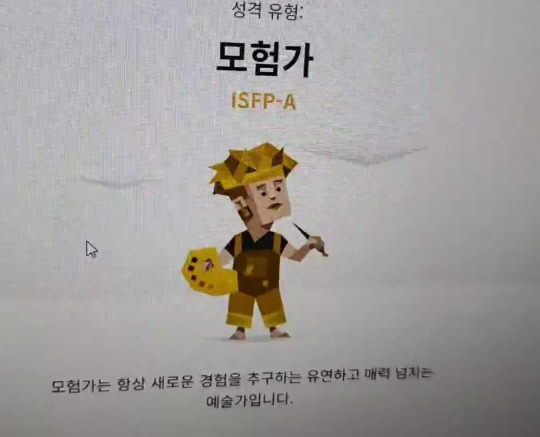
So Soobin went live today and retook the MBTI test, and he's an ISFP-A! Since he took the test live we actually have a record of his MBTI trait percentages, his responses, and even his thoughts on some of his responses. I thought it would be fun to do a little breakdown of his results and what they really mean from a personality psychology perspective! (Full disclosure: I am a research psychologist-in-training so I'll be applying what I know from my irl experiences.)
DISCLAIMERS: I don't know Soobin personally so all of my analyses will be based on his answers to the test as well as how he presents himself in public, such as lives, interviews, variety show appearances, etc. Also I am not affiliated with 16Personalities so I can't say with 100% certainty which test items are linked to which traits, and I don't know how their scoring system works, but I can make informed guesses based on my experiences with other personality tests.
Let's begin!
Prologue: The 16Personalities Franken-MBTI
For this case it's important that we talk about the version of the MBTI that Soobin took and how it works. He took the 16Personalities test, which is not the official version of the MBTI; that would be run by the Myers-Briggs Company (whose website is down as of this writing). The model of personality used by 16Personalities, called the NERIS model, is actually Frankenstein-ed from two different personality models - something they admit themselves in the theory section of their website:
With our NERIS® model, we’ve combined the best of both worlds. We use the acronym format introduced by Myers-Briggs for its simplicity and convenience, with an extra letter to accommodate five rather than four scales. However, unlike Myers-Briggs or other theories based on the Jungian model, we have not incorporated Jungian concepts such as cognitive functions, or their prioritization. Jungian concepts are very difficult to measure and validate scientifically, so we’ve instead chosen to rework and rebalance the dimensions of personality called the Big Five personality traits, a model that dominates modern psychological and social research.
Let's break down the two models used here.
The first is, of course, the Myers-Briggs Type Indicator, developed by Katharine Cook Briggs & Isabel Briggs Myers based on the work of Carl Jung. Classical MBTI is not based on personality traits but on cognitive functions, which are different ways of processing information around us: for example, the thinking function refers to the use of logical reasoning, while the feeling function refers to the use of value judgments. The goal of classical MBTI testing is to figure out which cognitive functions you use: which you default to, which helps your default, etc. This collection of cognitive functions is called a "stack," and your four-letter type tells you what the stack is made of.
The problem with cognitive functions is that they're virtually impossible to validate scientifically (even typologists can't agree on what a cognitive function is exactly), which is why they've fallen out of favor within mainstream research psychology. I don't know if the official MBTI test uses them (since their website is down I can't check), but plenty of unofficial MBTI tests don't, instead preferring the trait approach we're all familiar with. Are you introverted or extraverted? Are you a thinker or a feeler? etc.
This approach has its own issues (which I touch on a bit here), but it's the approach that 16Personalities also uses. Which brings me to the second model they use...
While the 16P test looks like MBTI, its content is actually based on the Five-Factor model, also known as the Big Five. The Big Five is actually a really good model with lots of scientific research to back it up, and (full disclosure!) it's my preferred model of personality. The premise behind the Big Five is that even though there are hundreds or even thousands of ways to describe human personality - just open a dictionary and look at how many words can be used to describe people - there are underlying patterns in our descriptions. For example, a person who is honest will most likely also be trustworthy. A person who is gregarious will most likely also be friendly. And so on.
By collecting real-world data from people in different cultures and using some special statistical techniques, researchers like Paul Costa & Robert McCrae were able to uncover these patterns as five personality traits: openness to experience, conscientiousness, extraversion, agreeableness, and neuroticism. (More on those later.)
I want to emphasize here that none of these personality traits are inherently good or bad. They can be bad in extremes, but the vast majority of people don't fall on those extremes anyway, and being high or low in a certain trait has its advantages and disadvantages. Your score in a trait can be good for some things, but not for others.
In the 16P NERIS model, each letter in your type corresponds not to a classical MBTI function, but to a Big Five personality trait. To make up for the fact that the Big Five has (duh) five traits and MBTI only has four, a fifth letter in the type was added. The resulting test from this is what Soobin took today.
Soobin's results, a Big Five perspective

Here I'll be looking at Soobin's results for each of the 16P traits and discussing what they mean. I'll support this with his responses to the test items (credits to translatingTXT on twitter for saving all of them), as well as things he's done or said publicly in the past.
Introverted/Extraverted
In classical MBTI typology, introversion/extraversion actually refers to your orientation when processing information: an extraverted orientation uses the external world (such as real-world rules and norms) as a frame of reference, while an introverted orientation uses the internal world (such as your personal beliefs and interpretations). But in the modern sense - including in the Big Five - this trait refers to the kind of energy you seek in the environment. This includes sociability - the social environment that you seek - but it also includes how stimulating your environment is overall. Extraverts are generally energetic and like stimulating environments, and are also more prone to positive emotions like joy and excitement.
Soobin scored 74% Introverted, and he's an introvert through and through; he likes being by himself and doing his own thing, and he finds social situations exhausting. But I also think that he's a great example of personality traits being different from skills. Sure, Soobin's an introvert, but he's got really good social skills; his personality probably means that these skills don't come as naturally to him, but he's still capable of learning them. He probably learned a lot during his time as Music Bank MC, and he's not afraid to go up to people and talk to them for life advice. And even though leadership isn't something he prefers especially compared to an extravert (see his answer below), it's clear that the members respect him as a leader and seek him out for help.




Observant/Intuitive (Openness to Experience)
In classical MBTI, this aspect of personality is called Sensing vs. Intuition, and refers to your use of two different cognitive functions: sensing refers to reliance on the five senses for information, while intuition refers to reliance on inner meanings and hidden symbols. The NERIS model reworks this into Observant vs. Intuitive (neither of which start with S or N, I know) to better fit the Big Five trait that their version is based on: openness to experience.
The trait of openness reflects a person's attitude towards things that aren't necessarily grounded in day-to-day reality - the abstract, the unconventional, the creative. People high in openness enjoy abstract ideas and intellectual pursuits, are often creative and imaginative, and don't mind ambiguity. People low in openness prefer things that are conventional and concrete, want things to have straightforward utility and a clear message.
Soobin's score is 64% Observant ("observant" here meaning low openness) - generally he prefers conventional, but I think he's close enough to a 50% average to say that he isn't purely a practical guy. He is, after all, an idol - people high in openness are often drawn to artistic pursuits, which includes music and performance. He has mentioned being interested in artistic things, like wanting to play the electric guitar.
But while Soobin definitely has a level of artistic interest, he seems more content in enjoying what he knows rather than expanding, and he's pretty secure in what he likes and dislikes - and I think this is where his Observant score comes in. Like, this is a guy whose favorite song in his own discography was Our Summer for the longest time before it was dethroned by Skipping Stones. He's also mentioned that he only participates in songwriting when the topic interests him, but isn't necessarily invested in it as a craft:
"I participate in writing the lyrics if the theme interests me. The tracks in this album [Temptation] all have interesting themes, you'll see when you get the album and see the lyrics too. They all have topics that I personally think and imagine about my life, so I participated in the lyric writing this time." (The Name Chapter: Temptation Recording Behind the Scenes)


Thinking/Feeling (Agreeableness)
I struggle with interpreting this one because I'm not exactly sure what the NERIS version of this trait is trying to measure. In classical MBTI (as mentioned above), the thinking function is about processing the objective content of information (logic, truth value), while the feeling function is about processing its subjective content (e.g. how well it conforms to certain values). The version of T/F commonly seen in pop-psych is "head or heart" - do you make decisions based on just the facts or on your feelings? But psychological research shows that this is a false dichotomy - we rely on our emotions to help think through things, and they often provide us with useful information. Happiness tells us things are going well, fear and anxiety tell us something is threatening us, and so on.
Nevertheless, NERIS tries to incorporate elements of this together with the Big Five trait it's drawing from, agreeableness. While extraversion is about how well you fit into social situations, agreeableness is about how you treat people in them. People high in agreeableness try to live in social harmony by getting along with others and practicing virtues that make things easier for them. People low in agreeableness might come across as abrasive, but they're also less sensitive to hate from others and more willing to take actions that might be unpopular.
Soobin's score is a 54% Feeling ("feeling" here meaning high agreeableness), and here we see the limitations of trait-style MBTI. The dichotomous nature of a trait hides what's going on; Soobin uses Feeling on paper, but in reality he's in the middle. This should be more apparent when we look at his responses and how he acts around others.
His agreeable side seems to come out more often when it comes to his circle of loved ones: his friends and family, the members, and MOAs. He's not afraid to show kindness and gratitude towards them and is touched when they do the same for him. One of his motivations for being an idol is wanting to give love to fans and appreciate the love they give back, and he clearly treats the idol-fan relationship as a special one.
On the other hand, Soobin has no problem brushing off or even standing up to haters, and he's said that he has no intentions of trying to please people who dislike him. A person higher in agreeableness (or Feeling, in this case) would be a bit more concerned about trying to appease them.
This in-the-middle mix of agreeableness is, honestly, a pretty good thing to have in a leader or an idol. You need a healthy amount of it to express love for your members, your staff, and your fans. But you also need a thick skin to withstand unfounded criticism, as well as a tolerance for conflict even when it's socially unpleasant.

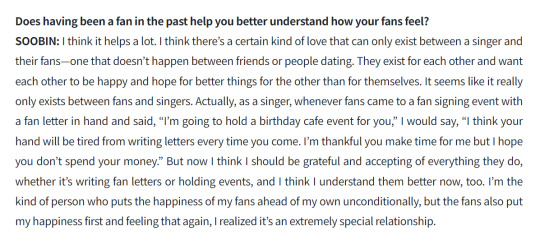
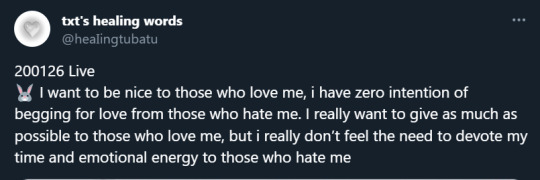
Judging/Prospecting (Conscientiousness)
In classical MBTI, this dimension is called Judging/Perceiving. It's not a pair of functions but instead a reference to help you figure out the functions in your stack: thinking and feeling are judging functions, sensing and intuition are perceiving functions. Like with S/N, NERIS renames this into Judging/Prospecting to better fit the Big Five trait it's drawing from, conscientiousness.
The trait of conscientiousness refers to one's ability to get things done and follow things through. People high in conscientiousness like to plan things in detail, are organized and goal-oriented, and generally finish what they start. People low in conscientiousness are more spontaneous and adaptable, dislike routine, and prefer to go with the flow.
Soobin's score is 86% Prospecting ("prospecting" here meaning low conscientiousness). I feel like this trait is harder to see for idols because they're always on company-mandated schedules of activities, but a really good example of this trait in action is his vacation in Japan vlog. Planning an itinerary doesn't come naturally to him, and he's okay with not following a strict sightseeing schedule so that he can relax more. For example, Soobin and his friend plan to go straight to an onsen on the second day of their trip, but they oversleep and have no problems changing their plans to just shopping and eating. They do get to the onsen eventually, but they're in no rush to. At one point in the video he even mentions his P trait as why planning is so hard for him (his score at the time was 96% P).
"This is my first time planning a trip abroad by myself. I boarded the plane myself, moved around, booked the hotel and planned everything myself. [...] Whenever I take an MBTI test I get like a 96% P, I didn't realize traveling was so hard." (15:47 - 16:39 of video)
This Weverse magazine quote also captures his spontaneous approach towards activities pretty well:



Assertive/Turbulent (Neuroticism)
This trait is exclusive to the NERIS model and was added to the four existing letters of MBTI to accommodate the additional trait of the Big Five. My biggest criticism of the NERIS model is that it treats A/T as an accessory to the other four traits instead of a trait of its own; ISFP-A and an ISFJ-A are treated as different types, but ISFP-A and ISFP-T are variations of the same type. It's not uncommon for people to leave out their A/T score when they talk about their 16Personalities results.
A/T is based on the Big Five trait of neuroticism, which is just as important as the other four - it predicts depression and anxiety disorders, for example. This trait reflects how we handle negative and stress-inducing events; people high in neuroticism feel stress easily, are prone to negative emotions like sadness and anxiety, and are more likely to self-criticize. People low in neuroticism might feel stress less, but might have a harder time registering risks and threats.
Soobin's score here is 65% assertive ("assertive" here meaning low neuroticism), again close to the average but with a leaning towards the low side. Again, this isn't an easy trait to observe in idols because a lot of the processes and actions associated with it are private and internal. But it does crop up from time to time, usually in per-performance nerves and jitters, but Soobin has mentioned that he's not the type who gets nervous easily. His answer here on how he handles stress also reflects this trait:
"I'm optimistic if you put it nicely, or some could say I'm shallow. So even if I get mad, I forget it quickly and easily. I believe that time will solve everything. So it's either the case gets resolved or my emotions die out, making me struggle less. I just think like that." (11:44 - 12:04 in video)
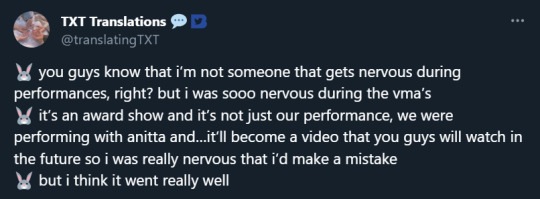

He's also not too critical of himself, which is pretty valuable in a profession where you're subjected to constant criticism as early are your trainee period. Not that Soobin is blind to his flaws; rather, he's not the type to get too worked up about them.
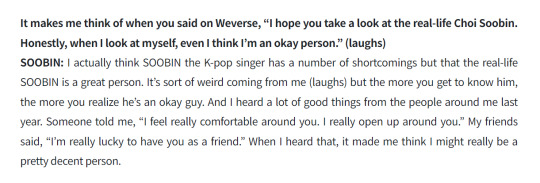

Final Thoughts
The major flaw of personality systems based on type (like classical MBTI and NERIS) is that the nuances of one's behavior are often lost in an easy-to-remember acronym that puts people into strict categories. The Big Five in its original form refers to the traits as continuums - you can be low, average, or high in a trait, often reflected as a percentile ranking based on how you compare to other test-takers - but even then, you don't see things like context or learned skills that may or may not match up with one's personality.
I've tried to untangle Soobin's personality here not just based on a catchy acronym type, but based on what those traits actually mean, how high or low they actually are, and on how they appear in context. I hope this little analysis will give a bit more insight not just on Soobin himself but also on how personality works!
—
tags for those interested: @goldennika @starburstfloat @mazeinthemoon @huenation
#soobin#txt soobin#tubatu#also sorry for any typos or incoherent bits i did not proofread this lol#feel free to ask questions and i can explain!
40 notes
·
View notes
Text




updated these since the old ones were from 2020. not much is different, erased with white a bunch of options to make it easier to look at for me, changed some minor numbers that dont rly matter bc its not that easy to put those numbers down anyway.
some talk thats mostly about their relation to me and stuff about me instead of stuff about them below ⬇ (actually i should fill one of those out for me myself too. that could be fun)
i adjusted junis brother a bit focusing on just how hes like at the moment of having been rescued to jorvik, rather than thinking about his potential "real personality" if he was able to heal and become a more developed person instead of just full of trauma. i do want to eventually do something with the concept of what if he healed, or what if he hadnt been abandoned in pandoria to begin with? if hes intj like me (his behaviour is based on how i am when im completely broken down, which sadly has happened a lot in my life) then what would it be like to see him healthy and happy? its stuff id like to think about more eventually
also filled in that juni is enfj. back then i wasnt so sure what parts of her were different than me, over time i developed it and she really clearly became enfj. we both share high Ni aka my dominant function as intj but her dom Fe plays into the whole constantly being in contact w ppl thing - im also very caring and loyal, and i genuinely want to save everyone on earth and want everyone to be healthy and happy. i want society to be fixed (and ive got the ideas) and i want ppl to be kind and loving to each other. me and juni share that. but for me, i cant really handle talking to normies much bc their reality is just too different than mine. juni has no problem socialising with anyone, even if she ofc also has ppl shes the closest to and others who she might not get along with as much, its still easy for her bc Fe just has that harmonising feelings thing with others that i dont have (and being a dominant extrovert function, and not being ND, shes also not as exhausted by socialisation).
for me with low Fi i just dont really get much out of socialising for socialisations sake. its part of why i cant handle being on discord servers and stuff like that. i dont "vibe" with people in that way, i want to actually have interesting and intimate conversations and learn more about my friends, their backstory, their problems (can i help them?), their deep and genuine feelings (not stemming from copying others and peer pressure, group-think is extremely irrelevant to me and i dont view people differently if theyre supposedly in-group or out-group - im interested in everyone as an individual). for my whole life ive just been too different and for many reasons not been part of normie's society, so its just really alien to talk to normies. (as in, the abuse and isolation, the disability, the ptsd and depression, the queerness, and also just being intj, not really having a normal brain. i often wonder if the ppl who say bad things about mbti - besides the obvious "job and school mbti use is bad" yeah it is - have known what its like to just not be able to relate to almost anyone around you ever when it comes to personality. even online, even in a nerdy group, even in a place with ND people, even with queer people, even with disabled people, youre still different. you still cant relate. for me, finding out that im just a weird personality type was really important, and then i was able to study other ppl's personality types and now i actually get why people behave the way they do and why society functions the way it does for better or worse. which is a great thing to understand imo. the "omg mbti bad bc jobs and school and the tests are dumb" is one thing, but studying the functions and really truly diving into how other people function and how theyre different from you and how you all work and how the human history of the world has happened, is beautiful to me.)
as a low Fi person, with a focus on 1-on-1 connection rather than groups, i focus on talking intensely to the beloved weirdos on my computer, or posting my rambles and reading you guys rambles in return. u guys prob dont even realise, but for a lot of u, i remember like... u posting about ur job or school one time. what u posted about that u wanted to do or what ur upset about. i think about what ur ocs symbolise, why u write them that way, what part of ur personality and your lived experience, your feelings, makes u project this or that on characters. i think that a lot of ppl treat social media as a more shallow and "a drop in the ocean" type of thing, but for me, even ppl ive not talked to much on my dash, if youve been my mutual for some time, i think about you and remember things about you. if you post music i listen to it both to see if i might like the song but also bc im interested in what you like. i like learning things about people around me, the same way i like learning things about the world in general and spend obscene amounts of time studying and analysing the world both in its current and past. its an intj thing because its about my dominant Ni function, which loves analysing patterns and taking in information to process. but i dont mean that in a cold way, its an intimacy and friendship to me to learn things about you and understand you. not to "vibe" but to really know someone and see the puzzle pieces of their life. im very much about all the puzzle pieces that makes you You. im not saying its wrong to vibe and chill instead of analysing your mutuals like puzzles, just that this is something thats very different from how i am, and its been hard for me in life to relate to the way most people are.
idk if anyones reading this but some of you also prob noticed that i will pop out of nowhere and talk to you about some random thing you posted thats interesting to me, or send you a message of support if youre going through hard times. i remember when you posted that you were really sad and i notice that youre having a hard time when you post that youre sad again a month later. idk, its hard for me because im not always very emotional in a way that other people understand. i can come off as cold or quiet which in turn can come off as disinterested. but i just wanted to write it somewhere, to put out into the cosmos, that actually i care a lot about the little creatures on my dashboard and i hope that you notice even if my personality and behaviour is a bit different than what people are used to. people project mean things on me sometimes because im confident, for example, or because i stand up against things i think are harmful. because im not "loyal" if i tell a friend that theyre being rude, or im "rude" if im saying capitalism is bad. i can be projected as controlling (telling people "no" when theyre mean) or self-important (being confident in my skills and analysis) and other negative traits which is really unfair to do to someone just bc theyre different. to me i view everyone equally and i will tell off a friend if i have to, without meaning anything unkind by it. idk. ill stop rambling now bc its too much again (high Te will also do that) but i just have feelings and thoughts about that my beloved mutuals dont even know that theyre beloved and that my way of expressing myself is weird and its hard to live in society based around ppl who are very different than me in many ways. but learning mbti / jung functions was really great for me to feel understood and to understand others.
14 notes
·
View notes
Text


fellow mbti enthusiasts
you should try out the mistype investigator. It uses cognitive functions and has neurodivergent-friendly questions (plus a slider, instead of the yes-no format). It gives you everything you need to start researching if you're unsure about your type.
If you're sure of your type, it's still interesting because you'll see where you're likely to be mistyped by others. That or simply see what other types relate to more than you'd expect, because you've developed your weaker functions.
In my opinion, anyway.
🧠
Also. The screenshots aren't an invitation for anyone to type me (can always go to Reddit for that 😩). Included them so you can see how the the mistype investigator displays the results. I'm aware of how sorta close my Ne/Ni and how tight my Te/Ti scores are. Try growing up with an ENTJ dad (TeNi) and INFJ mother (NiFe), lol I HAD TO DEVELOP Ni TO SURVIVE AROUND THEM both (and Te in hopes my dad would like me more I guess, didnt work so whatever). anyway My Ni & Te use is a learned skill, not my default setting or my happy place
But anyway ya enjoy the link, just thought I'd drop it here until I get back to regular posting
Edit to add: Another test I like that gives similarly nuanced results, with a bit more explanation
And screenshots from my top 2 results so you see the difference between this and the Mistype Investigator:
entp - 77 pts (my type, at least for as long as I don't run into anything that debunks my 3 years of research on this lol)
intp - 76 pts (I developed social anxiety disorder in my early 20s, which skews my answers towards people avoidance. I know I don't recharge when alone though, so I'm not an introvert, just an extrovert with issues)


"Trouble actually finishing anything"
i mean yeah but 🤣 jfc chill on me though
16 notes
·
View notes